HVAC Systems
13 Essential Tips for HVAC Heat Pump Troubleshooting

Get the inside information on how to troubleshoot HVAC heat pumps with our 13 crucial tips. You’ll learn to identify and resolve frequent problems like an expert.
From checking power and thermostat functionality to evaluating refrigerant levels, we’ve got you covered.
Whether your heat pump is cycling on and off or not heating/cooling properly, we’ve got the solutions.
And if all else fails, we’ll guide you on seeking professional help and offer maintenance tips for long-lasting performance.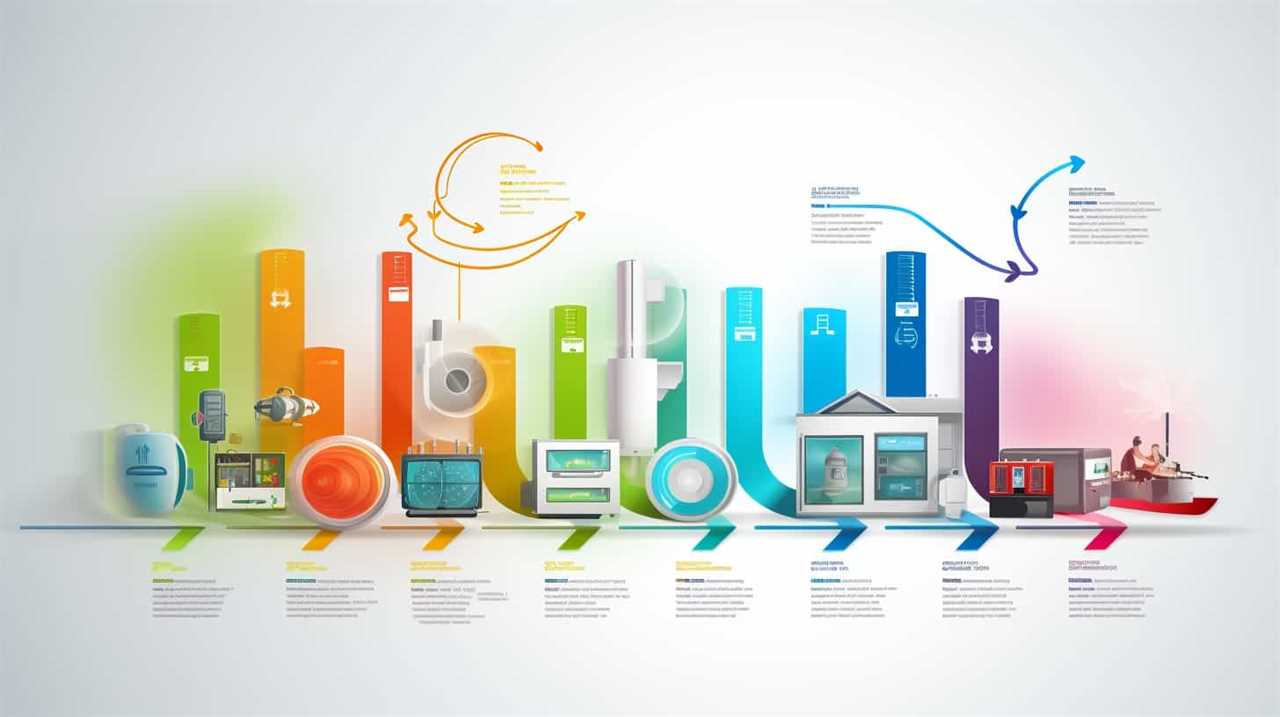
Get ready to conquer any heat pump problem!
Key Takeaways
- Regular maintenance is crucial for troubleshooting power and electrical issues.
- Testing voltage and current is necessary to ensure proper functioning.
- Assessing thermostat functionality is important for heat pump troubleshooting.
- Cleaning air filters regularly is essential for extended system lifespan and improved indoor air quality.
Understanding the Basics of HVAC Heat Pumps
Let’s start by breaking down the basics of HVAC heat pumps. Understanding heat pump efficiency is crucial for troubleshooting common heat pump errors.
Heat pumps are designed to transfer heat from one place to another, providing both heating and cooling functions. They work by extracting heat from the air or ground and transferring it indoors or outdoors, depending on whether you need heating or cooling.
Heat pump efficiency is measured by the coefficient of performance (COP), which indicates the ratio of heat output to the amount of energy input. A higher COP means better efficiency.
Common heat pump errors include insufficient heating or cooling, noisy operation, and frequent cycling.
Checking for Power and Electrical Issues
When troubleshooting HVAC heat pump issues, it’s crucial to first check for power supply problems and electrical connection issues.
We need to ensure that the heat pump is receiving the necessary power to function properly. By testing the voltage and current, we can determine if there are any electrical faults that may be causing the problem.
Power Supply Problems
We need to check the power supply for any issues or problems that may be affecting the HVAC heat pump. Power supply troubleshooting is an essential step in heat pump troubleshooting, as common power supply issues can cause the HVAC system to malfunction or not work at all.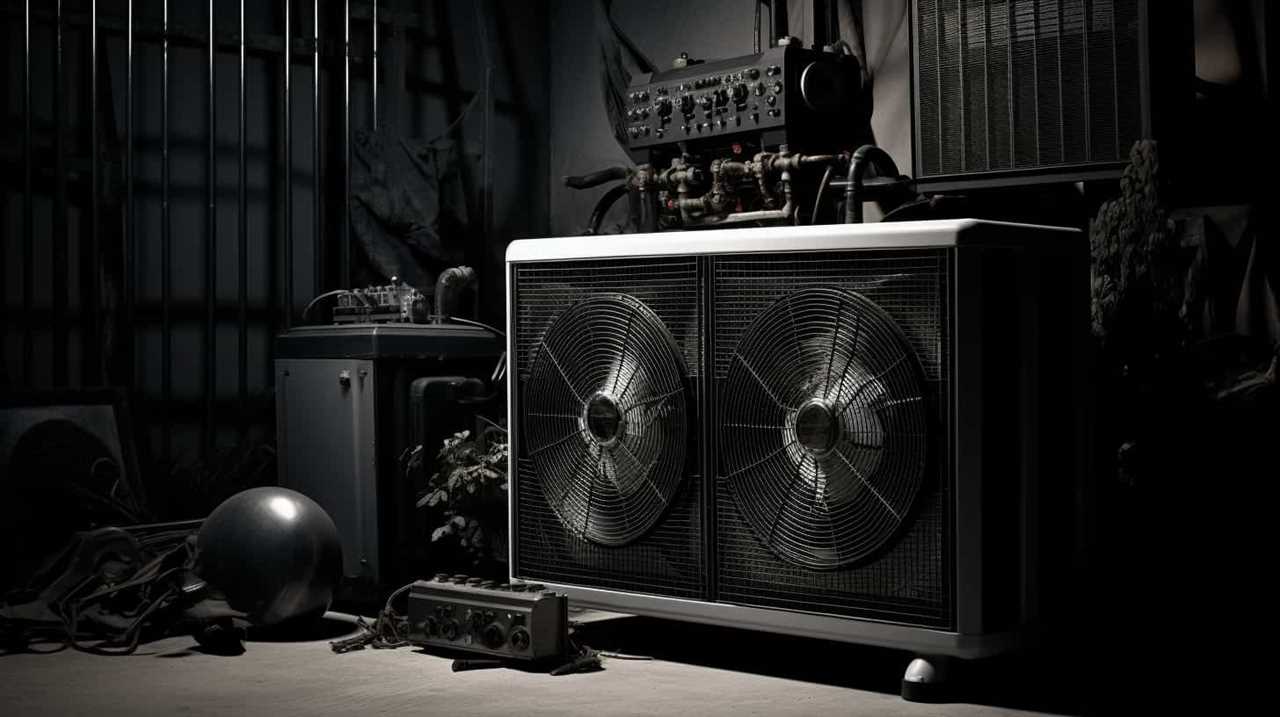
Here are some common power supply issues to look out for:
Tripped circuit breaker: A tripped circuit breaker can disrupt the power supply to the heat pump. Check the circuit breaker panel and reset any tripped breakers.
Blown fuse: Similar to a tripped circuit breaker, a blown fuse can also interrupt the power supply. Inspect the fuses in the disconnect box and replace any blown fuses.
Loose electrical connections: Over time, electrical connections can become loose, leading to poor power supply. Check all electrical connections and tighten any loose ones.
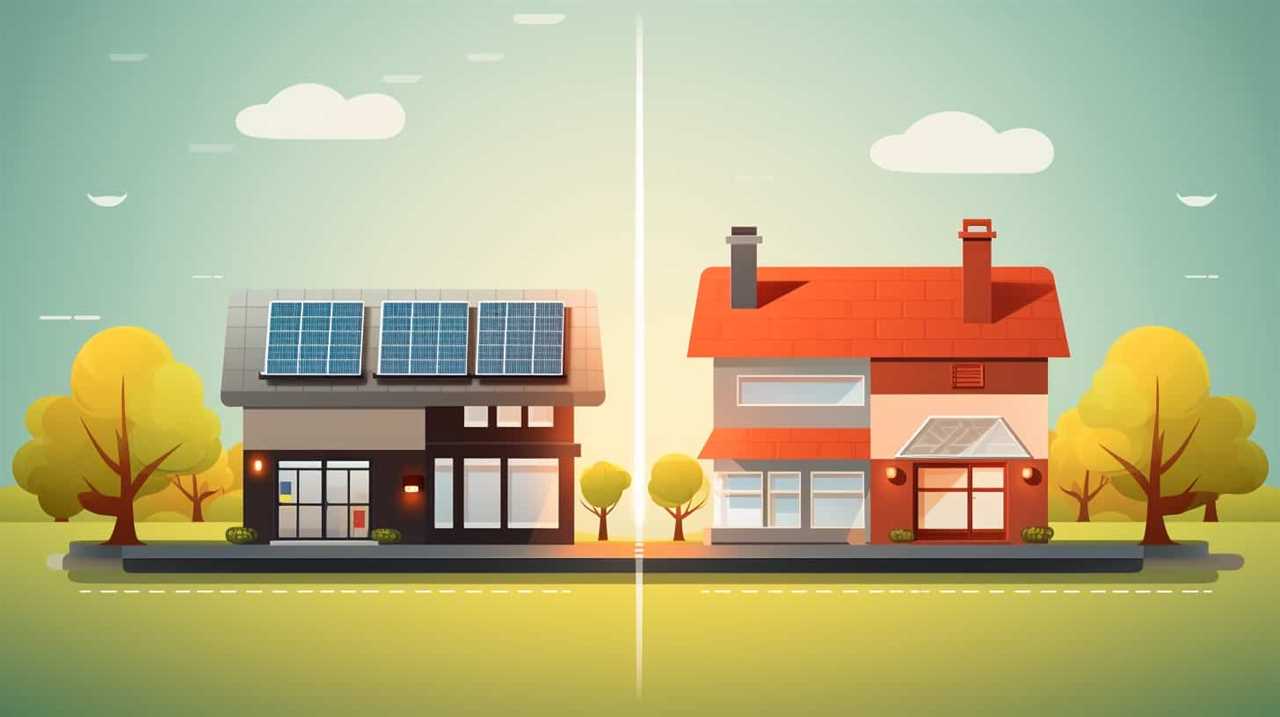
Faulty thermostat: A faulty thermostat can prevent the heat pump from receiving the necessary power signals. Test the thermostat and replace it if necessary.
Electrical Connection Troubleshooting
Do we know if there are any power or electrical issues that could be affecting the HVAC heat pump?
In order to troubleshoot these common electrical issues, it’s crucial to perform regular electrical connection maintenance. The first step is to check the power supply. Ensure that the circuit breaker is on and that there’s power flowing to the heat pump. If there’s no power, check the electrical panel for any tripped breakers or blown fuses.
Additionally, inspect the wiring connections for any loose or damaged wires. Tighten any loose connections and replace any damaged wires as needed. It’s also important to check for any signs of overheating or burning around the electrical connections.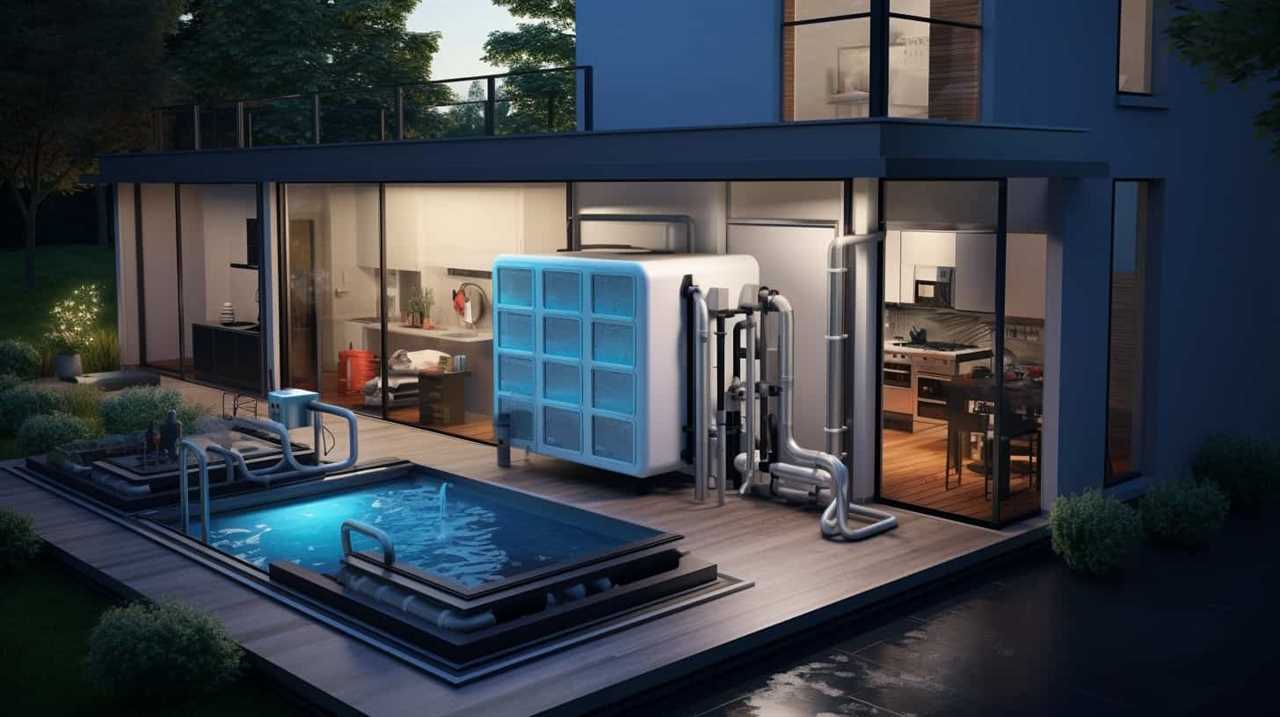
Testing Voltage and Current
After ensuring the power supply is connected, we can begin testing voltage and current to check for any power and electrical issues affecting the HVAC heat pump. Testing voltage and current is crucial in troubleshooting the heat pump as it helps identify any problems related to power supply or electrical components.
Here are four important aspects to consider when conducting voltage and current measurement:
Voltage drop: Measure the voltage drop across different components to ensure they’re receiving the correct voltage. A significant voltage drop may indicate a problem with the wiring or connections.
Current draw: Measure the current draw of the heat pump to ensure it’s within the manufacturer’s specifications. Abnormal current draw could indicate a fault with the motor or compressor.

Continuity: Test for continuity in the electrical circuits to ensure there are no breaks or open circuits. Poor continuity can lead to intermittent or no power supply.
Grounding: Check the grounding of the heat pump system to ensure there’s a proper path for electrical current to flow. Inadequate grounding can lead to electrical hazards and system malfunctions.
Assessing Thermostat Functionality
To accurately assess thermostat functionality, we need to check if the temperature readings are consistent and if the thermostat is responding to changes in temperature settings. Evaluating thermostat performance is crucial in troubleshooting thermostat issues.
Start by verifying that the temperature readings on the thermostat match the actual room temperature. This can be done using a separate thermometer. If there’s a discrepancy, recalibrate the thermostat or replace it if necessary.
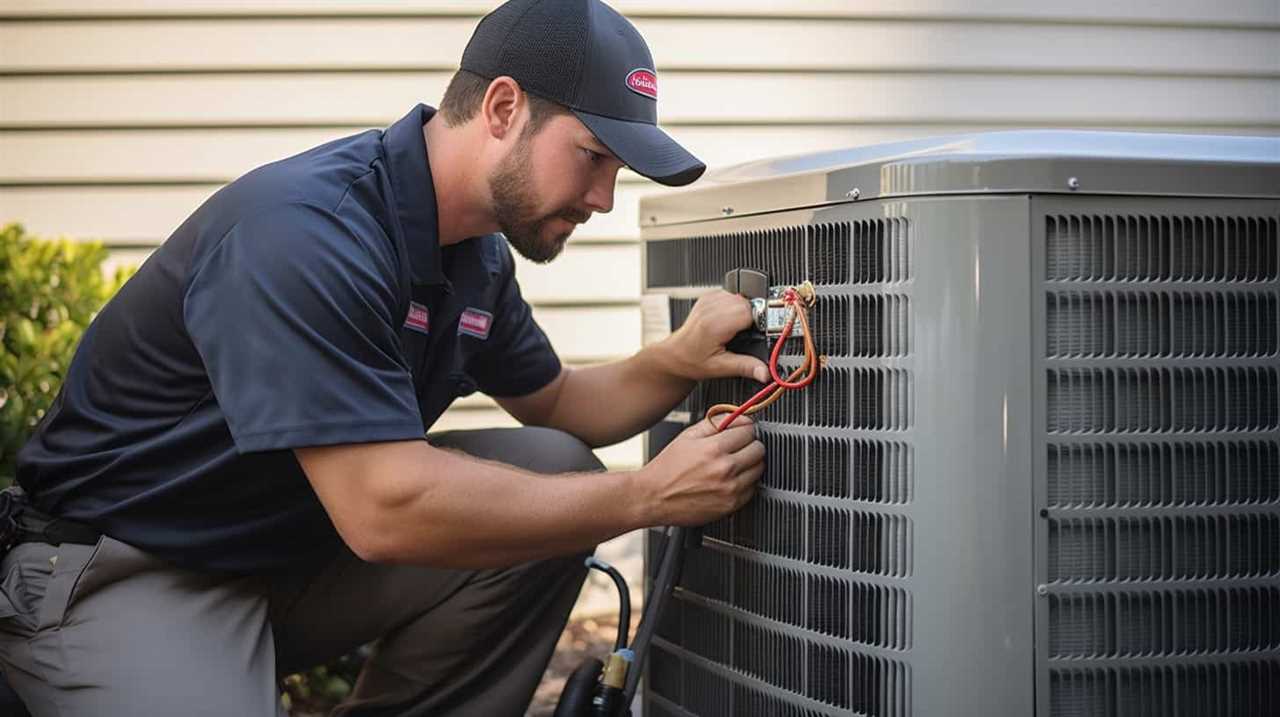
Next, test if the thermostat is responsive to changes in temperature settings. Adjust the thermostat to a higher or lower temperature and observe if the heating or cooling system kicks on accordingly. If there’s no response, check the wiring connections and ensure they’re secure. Additionally, ensure that the thermostat is powered properly and that the batteries aren’t dead.
Inspecting and Cleaning Air Filters
Let’s start by examining and cleaning the air filters in our HVAC heat pump system. Air filter maintenance is crucial for the efficient operation of your system and the overall air quality in your home. Here are some important points to consider:
Regular cleaning: Cleaning the air filters on a regular basis helps prevent dust, dirt, and debris from accumulating and clogging the system. This ensures proper airflow and improves the system’s performance.
Improved indoor air quality: Clean air filters trap allergens, pollutants, and airborne particles, preventing them from circulating in your home. This is especially important for individuals with respiratory conditions or allergies.
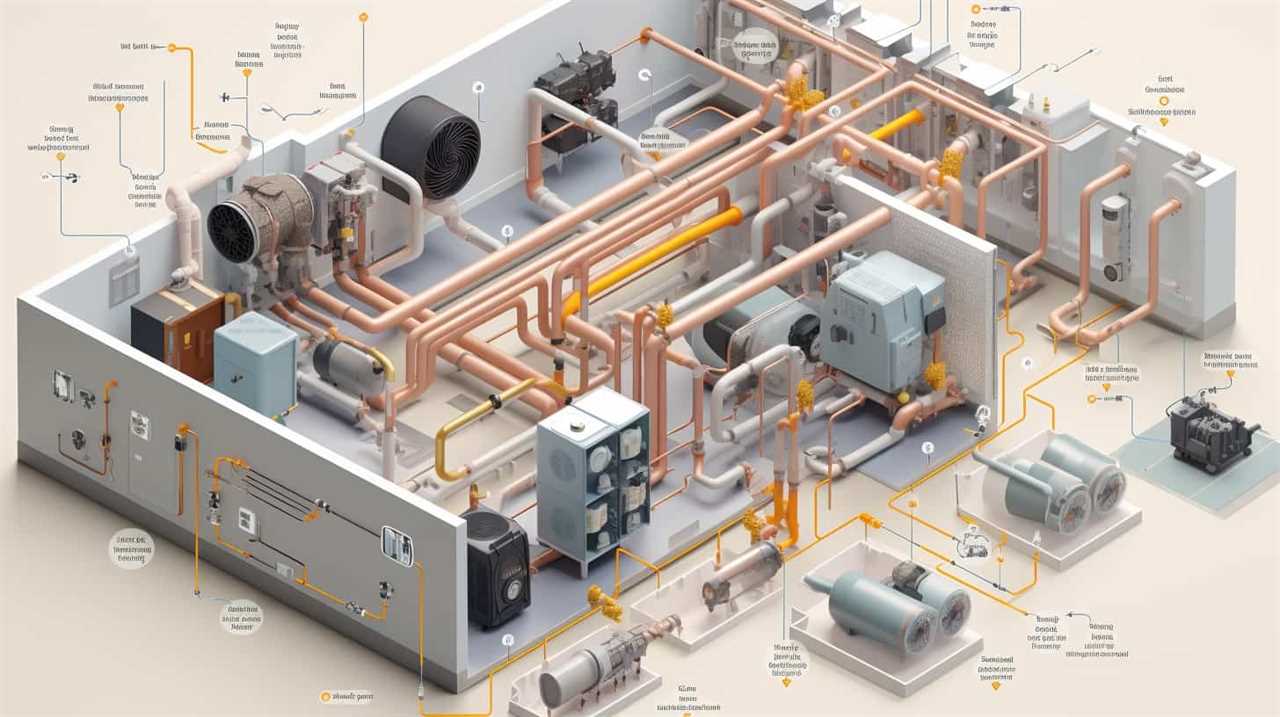
Extended system lifespan: By regularly cleaning the air filters, you reduce the strain on the HVAC heat pump system, increasing its lifespan and preventing costly repairs or replacements.
Energy efficiency: A clean air filter allows the system to operate more efficiently, saving energy and reducing utility bills.
Evaluating Refrigerant Levels
When evaluating refrigerant levels, we should use a pressure gauge to measure the pressure of the refrigerant in the system. This is an important step in troubleshooting HVAC heat pumps because improper refrigerant levels can lead to reduced efficiency and performance issues.
If the pressure is too low, it may indicate a refrigerant leak, which should be addressed promptly to prevent further damage to the system. On the other hand, if the pressure is too high, it could indicate a problem with the defrost cycle.
By evaluating the refrigerant levels, we can identify any potential issues and take the necessary steps to resolve them.
Once we’ve completed this evaluation, we can move on to checking for airflow restrictions, which is another crucial aspect of HVAC heat pump troubleshooting.
Checking for Airflow Restrictions
When troubleshooting HVAC heat pumps, it’s crucial to check for airflow restrictions.
There are several common points to consider: dirty air filters, blocked vents or registers, and an obstructed outdoor unit.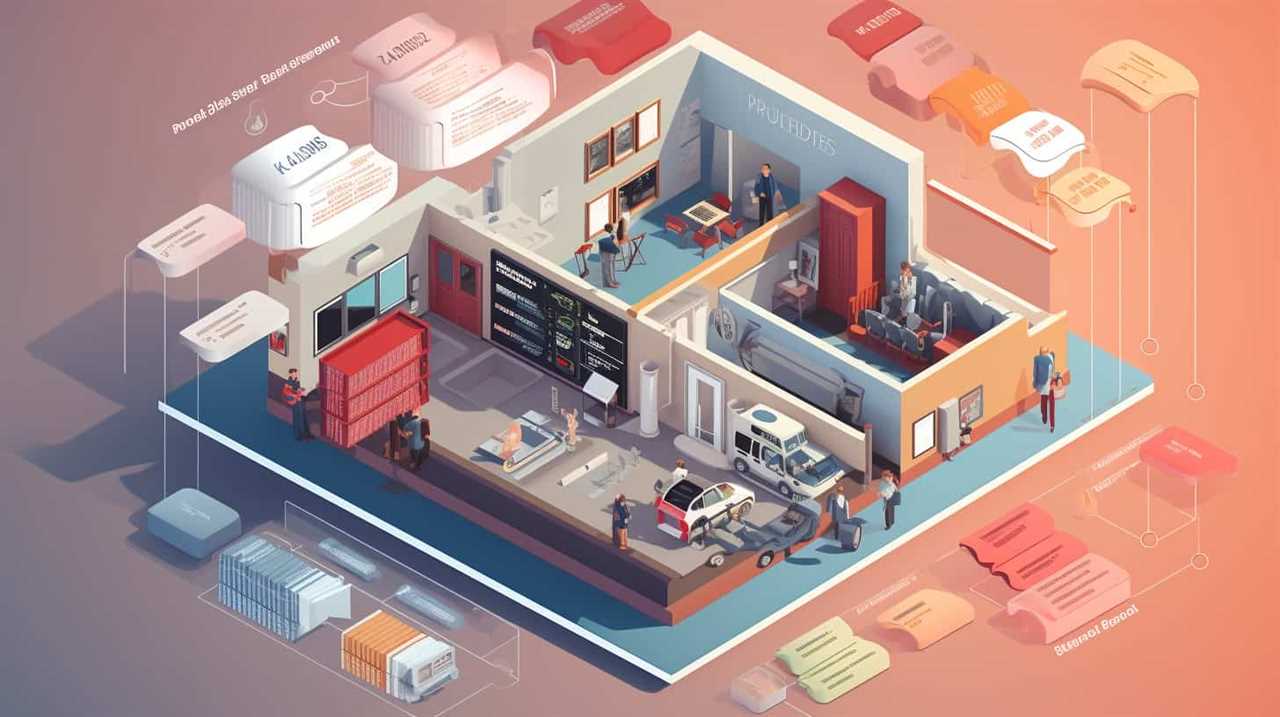
Dirty air filters can restrict the flow of air, leading to reduced efficiency and performance.
Blocked vents or registers can disrupt the airflow throughout the system, causing uneven heating or cooling.
Finally, an obstructed outdoor unit can impede the heat exchange process, resulting in poor heat transfer.
Dirty Air Filters
As we check for airflow restrictions, it’s important to address the issue of dirty air filters. Dirty air filters can significantly hinder the performance of your HVAC heat pump system, causing reduced airflow and decreased efficiency. Here are some key points to consider:
Clogged Ducts: When air filters become dirty, they can cause dust and debris to accumulate in the ductwork, leading to clogs and restricted airflow.
Dirty Evaporator Coil: A dirty air filter allows particles to bypass and settle on the evaporator coil, reducing its ability to absorb heat effectively.
Decreased Indoor Air Quality: Dirty air filters can circulate pollutants, allergens, and contaminants throughout your home, leading to respiratory issues and discomfort.
Increased Energy Consumption: Restricted airflow due to dirty air filters forces the system to work harder, resulting in higher energy consumption and increased utility bills.
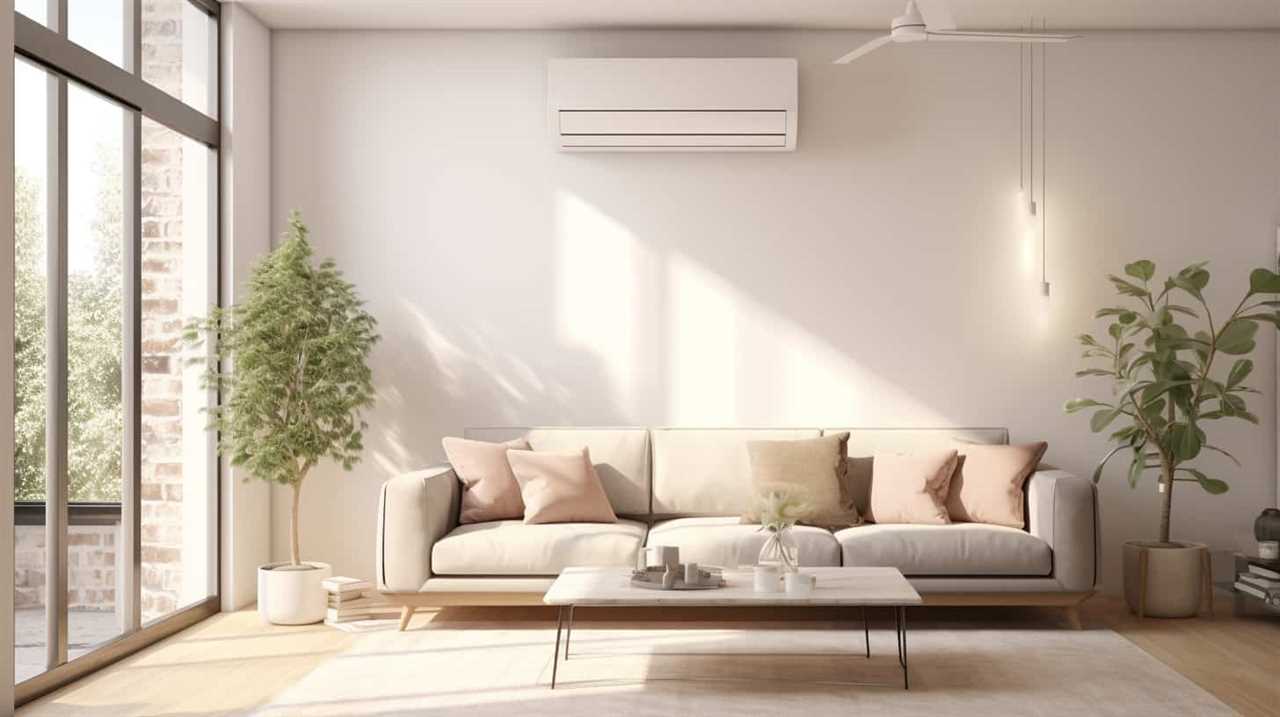
Regularly checking and replacing dirty air filters is crucial to maintain optimal airflow and ensure the efficiency and longevity of your HVAC heat pump system.
Blocked Vents or Registers
To ensure proper airflow and prevent restrictions, we need to address the issue of blocked vents or registers.
Blocked vents can significantly impact the performance of your HVAC heat pump system, leading to poor heating or cooling efficiency. There are several common causes for blocked vents, including furniture placement, debris accumulation, or closed dampers.
Troubleshooting vent obstructions involves a systematic approach. Start by checking each vent and register throughout your home, ensuring they’re clear from any obstructions. Remove any furniture or objects that may be blocking the airflow.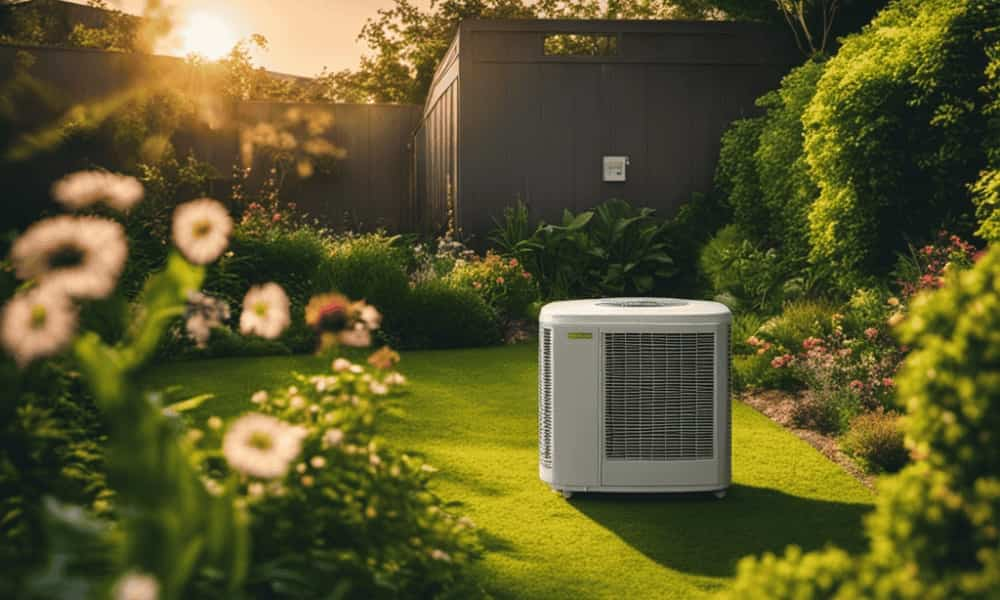
Additionally, inspect the vents for any accumulated dust or debris and clean them if necessary. Finally, make sure that the dampers are open and not restricting the airflow.
Obstructed Outdoor Unit
We must ensure that there are no obstructions or restrictions in the airflow of the outdoor unit for optimal performance. A blocked condenser or frozen coils can severely impact the efficiency and effectiveness of your HVAC heat pump. To prevent these issues and maintain the proper airflow, here are some essential tips:
- Clear any debris, such as leaves or dirt, from the outdoor unit.
- Trim back any vegetation or shrubs that may be obstructing the airflow.
- Check the outdoor unit for any physical obstructions, such as fallen branches or objects.
- Inspect the surrounding area for any potential sources of airflow restrictions, like fences or walls.
Investigating Outdoor Unit Problems
When inspecting outdoor unit problems, we should start by checking for any visible damage or obstructions. This includes examining the fins, coils, and fan blades for any signs of wear, bending, or dirt buildup.
Additionally, it’s crucial to investigate refrigerant leaks as they can lead to decreased cooling efficiency and potential system failure. One way to identify refrigerant leaks is by inspecting the refrigerant lines for any oil or refrigerant stains.
Another common issue with outdoor units is troubleshooting defrost cycle problems. This can be done by checking the defrost control board, defrost thermostat, and defrost sensor for any faults.
It’s also essential to ensure that the outdoor unit is free of ice or snow buildup, as this can affect the unit’s performance.
Troubleshooting Compressor Issues
When it comes to troubleshooting compressor issues in an HVAC heat pump, there are a few common problems that can arise.
One issue is a noisy compressor, which could be caused by loose or worn parts, requiring tightening or replacement.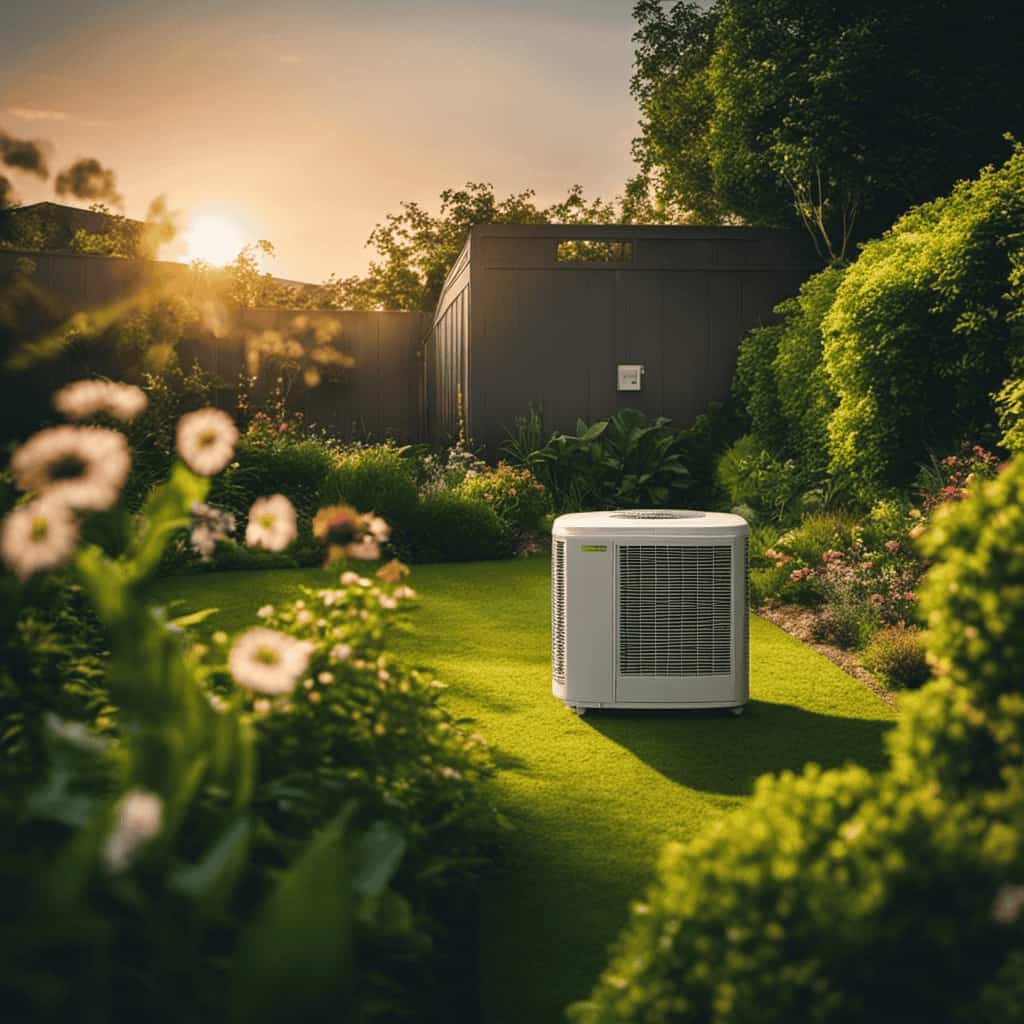
Another problem could be a compressor that isn’t starting, which may be due to electrical issues or a faulty capacitor.
Lastly, compressor short cycling, where the compressor turns on and off frequently, could be caused by refrigerant leaks or a malfunctioning thermostat.
Noisy Compressor Solutions
If you hear a noisy compressor, there are several solutions you can try to troubleshoot and resolve the issue.
Here are some noise reduction techniques for compressor maintenance:
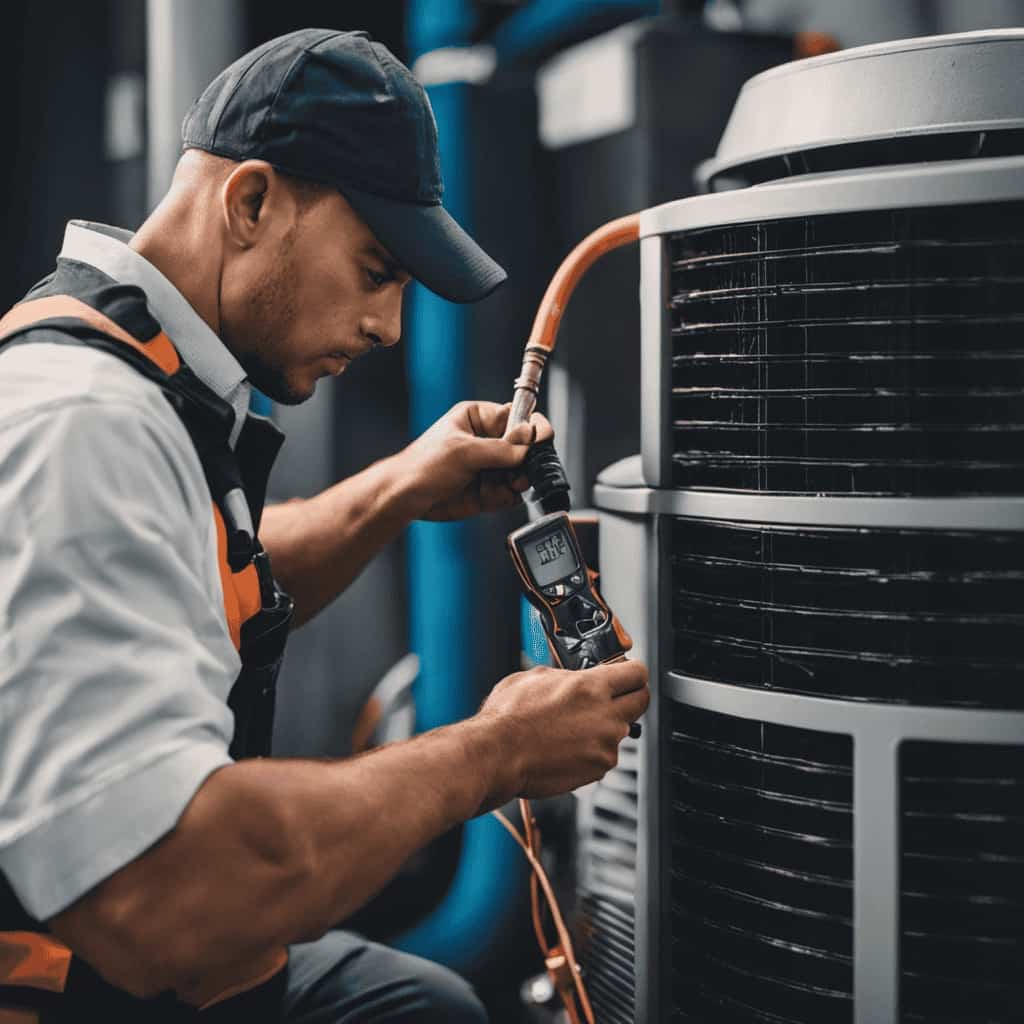
Check for loose components: Inspect the compressor for any loose bolts or screws. Tighten them if necessary to reduce vibrations and noise.
Clean the compressor: Dust and debris can accumulate on the compressor, causing it to work harder and produce more noise. Regularly clean the compressor to ensure optimal performance.
Insulate the compressor: Adding insulation around the compressor can help absorb sound waves and reduce noise levels.
Install vibration pads: Placing vibration pads under the compressor can help minimize vibrations and noise transmission to the surrounding areas.
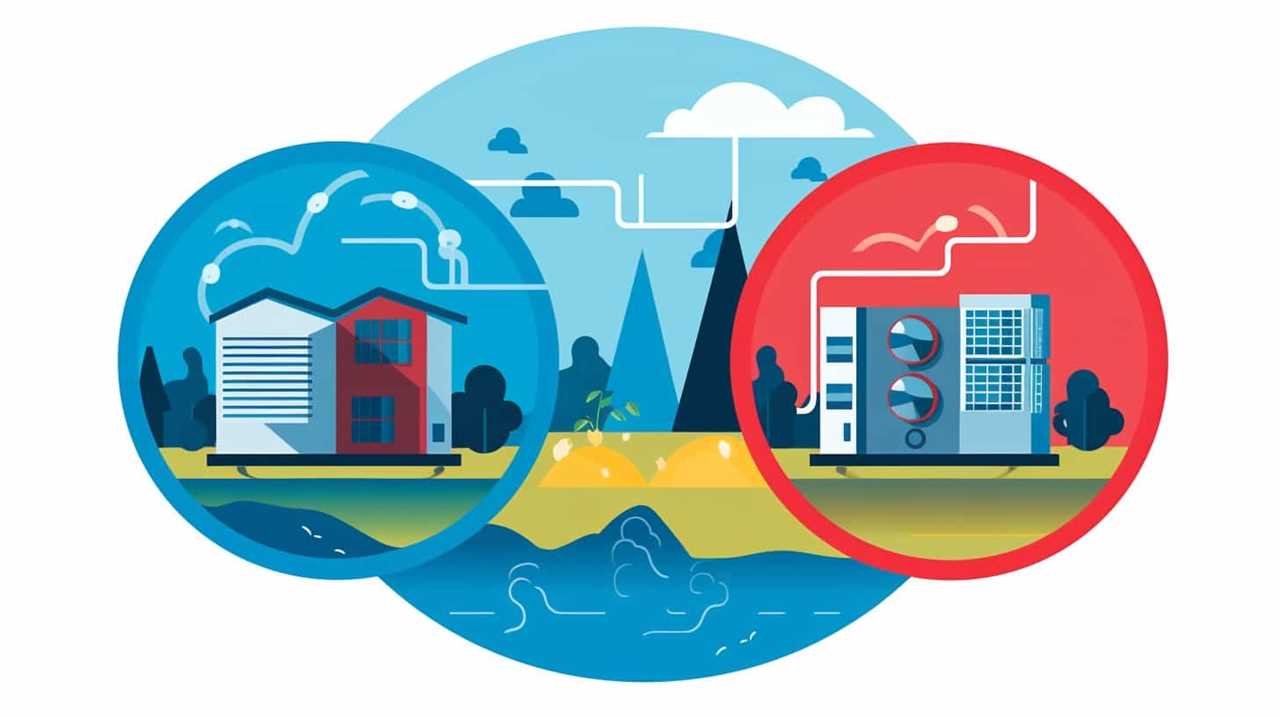
Compressor Not Starting
Have we checked the power supply and circuit breaker to troubleshoot why the compressor is not starting? It is important to ensure that the heat pump is receiving power and that the circuit breaker has not tripped. If the power supply and circuit breaker are functioning properly, we can move on to troubleshooting the compressor itself.
When troubleshooting compressor issues, it is helpful to refer to a table that outlines possible causes and solutions. Here is a 3×3 table that can assist in diagnosing and resolving compressor problems:
| Possible Cause | Solution |
|---|---|
| Faulty capacitor | Replace the capacitor |
| Burned-out motor | Replace the motor |
| Low refrigerant levels | Check for leaks and recharge |
Compressor Short Cycling
To troubleshoot compressor short cycling, we should examine the thermostat settings and the refrigerant levels. Here are some important points to consider when dealing with this issue:
Thermostat settings: Ensure that the thermostat is set correctly and that it isn’t causing the compressor to turn on and off frequently. Incorrect temperature settings or a faulty thermostat can lead to short cycling.

Refrigerant levels: Low refrigerant levels can cause the compressor to overheat, leading to short cycling. Check for any refrigerant leaks and address them promptly. It’s crucial to maintain the proper refrigerant levels for optimal compressor performance.
Compressor overheating: A compressor that’s running too hot can result in short cycling. Inspect the compressor for any signs of overheating, such as excessive noise or a burning smell. If the compressor is overheating, it may require professional attention to prevent further damage.
Refrigerant leak detection: Detecting and repairing refrigerant leaks is essential to prevent compressor issues and ensure efficient heat pump operation. Use leak detection equipment and techniques to identify any leaks and repair them promptly.
Addressing Strange Noises or Odors
We often encounter strange noises or odors coming from our HVAC heat pump. Identifying unusual sounds is crucial in troubleshooting and fixing any underlying issues. Unusual sounds can range from rattling, buzzing, grinding, or squealing noises, which may indicate loose or worn-out components, such as fan blades, motors, or belts. It’s important to inspect these parts and tighten or replace them if necessary.
On the other hand, addressing strange smells requires a different approach. Foul odors, such as burning or musty smells, can be caused by a variety of issues, including dirty air filters, mold or mildew growth, or even electrical problems. Regularly cleaning or replacing air filters and having the system professionally inspected can help resolve these issues and improve the overall air quality in your home.
Testing the Defrost Cycle
During winter months, we can test the defrost cycle of our HVAC heat pump to ensure its proper functioning. The defrost cycle is crucial for removing ice buildup on the outdoor coil, allowing the heat pump to operate efficiently.
Here are some essential steps to troubleshoot and test the defrost cycle:
Check the defrost thermostat: Ensure that it’s functioning correctly and set at the right temperature.
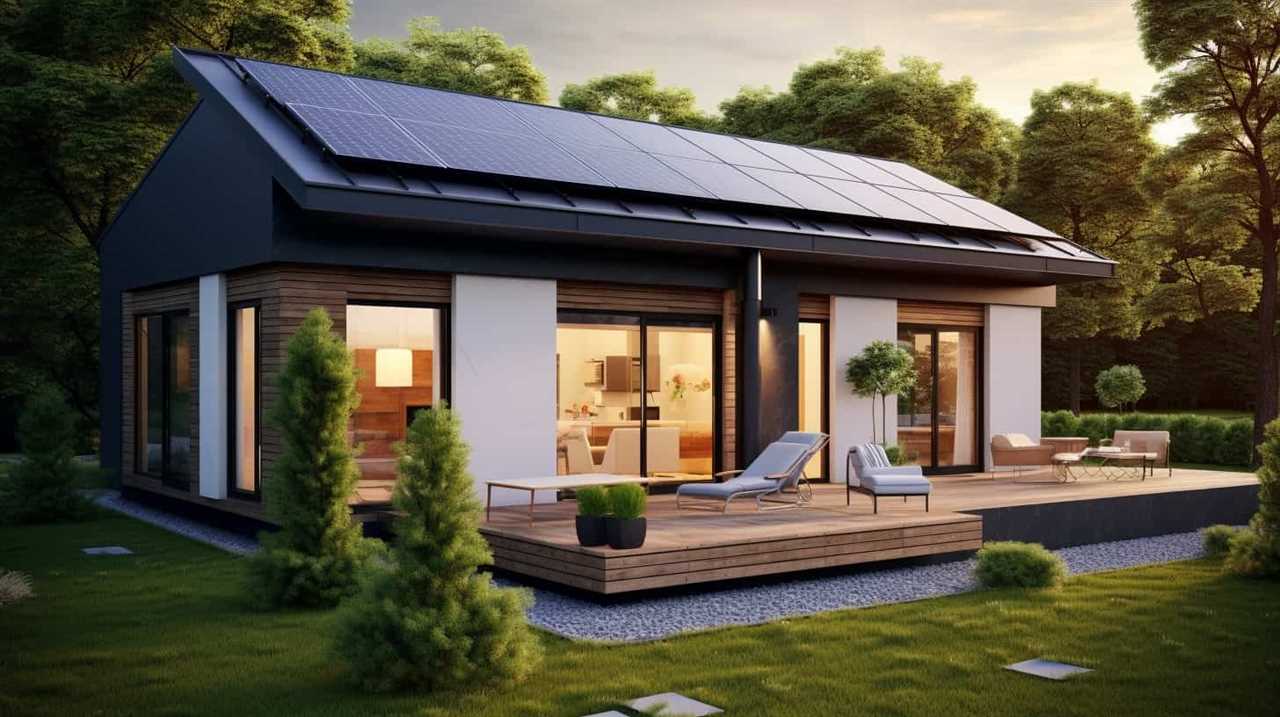
Inspect the defrost control board: Look for any signs of damage or malfunction and replace if necessary.
Test the defrost sensors: Use a multimeter to check if the sensors are reading the correct temperature and replace if faulty.
Examine the outdoor coil: Inspect for excessive ice buildup or blocked airflow, which can indicate defrost cycle issues.
Troubleshooting Heat Pump Cycling On and Off
When troubleshooting a heat pump that is not heating or cooling properly, there are several potential causes to consider. One common issue is a dirty air filter, which can restrict airflow and reduce the unit’s efficiency. Checking and replacing the air filter regularly can help resolve this problem. Another possible cause is a malfunctioning compressor, which is responsible for circulating the refrigerant and facilitating heat transfer. If the compressor is not functioning correctly, it may need to be repaired or replaced. Additionally, inadequate refrigerant levels can also impact the heat pump’s ability to heat or cool effectively. A qualified technician can check the refrigerant levels and recharge the system if necessary. Other potential causes of inadequate heating or cooling include issues with the thermostat, the outdoor unit fan motor, or the ductwork. Troubleshooting these components may involve inspecting and adjusting the thermostat settings, testing the fan motor, and examining the ductwork for leaks or blockages. By addressing these potential issues, we can ensure that the heat pump operates efficiently and provides optimal heating and cooling performance.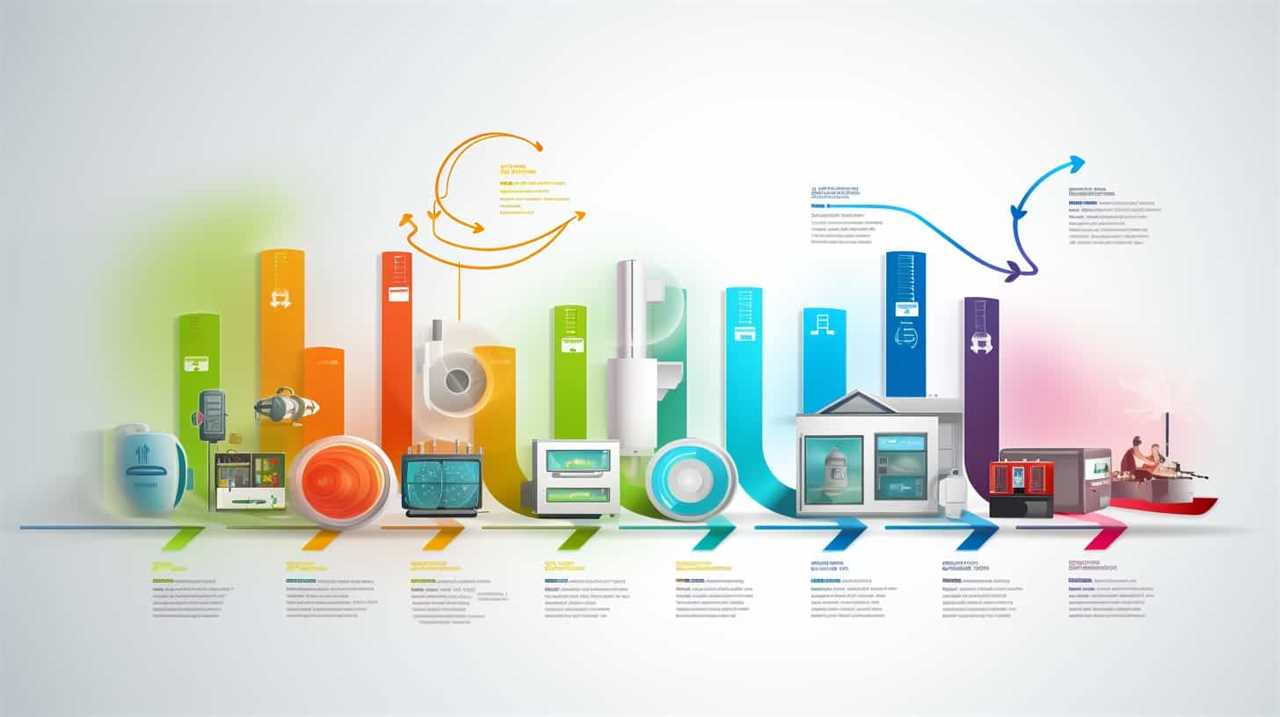
Resolving Issues With Heat Pump Not Heating or Cooling Properly
To properly resolve issues with a heat pump not heating or cooling, it’s important to identify and address the underlying causes. Here are some key steps to take when troubleshooting these problems:
Check the thermostat: Ensure that the thermostat is set to the desired temperature and is functioning properly. Resolving thermostat malfunctions can often solve heating or cooling issues.
Inspect the refrigerant: Low refrigerant levels due to leaks can hinder the heat pump’s ability to heat or cool effectively. Troubleshooting refrigerant leaks and replenishing the levels may be necessary.
Clean or replace air filters: Dirty or clogged filters can restrict airflow, affecting the heat pump’s performance. Regularly cleaning or replacing the filters can help resolve inadequate heating or cooling.

Inspect the outdoor unit: Check for any debris, ice buildup, or obstructions around the outdoor unit. Clearing these can restore the heat pump’s proper functioning.
Seeking Professional Help and Maintenance Tips
If we are unable to resolve the issues with our heat pump after troubleshooting, it is important to seek professional help and follow maintenance tips to ensure proper functioning. Professional maintenance is crucial in order to keep your heat pump running efficiently and to prevent any further issues. HVAC professionals have the expertise and tools necessary to diagnose and fix complex problems that may be beyond our capabilities. They can also provide regular maintenance to keep your heat pump in top shape. In addition to seeking professional help, there are some maintenance tips that we can follow to ensure the longevity of our heat pump. These include regularly cleaning or replacing air filters, keeping the outdoor unit clear of debris, and scheduling annual inspections. By following these troubleshooting techniques and seeking professional assistance when needed, we can ensure the optimal performance of our heat pump.
| Maintenance Tips | Benefits |
|---|---|
| Regularly clean or replace air filters | Improves indoor air quality |
| Keep the outdoor unit clear of debris | Prevents airflow restrictions |
| Schedule annual inspections | Identifies potential issues early |
| Check and clean the condensate drain | Prevents water damage and mold growth |
| Lubricate moving parts | Reduces friction and extends lifespan |
Frequently Asked Questions
Can I Use My Heat Pump as a Primary Heating Source in Extremely Cold Weather?
Yes, you can use a heat pump as a primary heating source in extremely cold weather. However, there are pros and cons to consider. Heat pumps are efficient but may struggle to provide sufficient heat compared to traditional heating systems.
How Often Should I Replace the Air Filters in My Heat Pump?
We should replace the air filters in our heat pump regularly to ensure its proper functioning. By maintaining a consistent air filter replacement frequency, we can prevent dust and debris buildup, improving overall heat pump maintenance.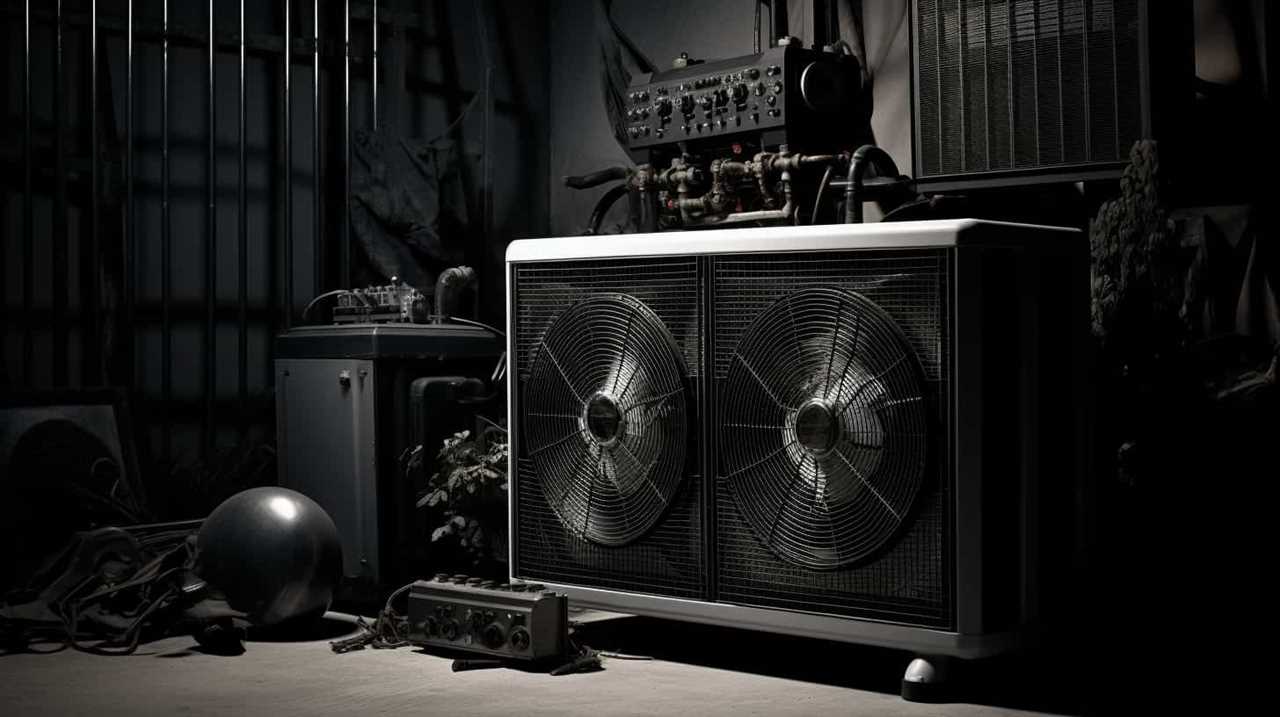
What Should I Do if My Heat Pump Is Blowing Cold Air Instead of Warm Air?
If your heat pump is blowing cold air instead of warm air, there are a few troubleshooting steps we can take. Check the thermostat settings, ensure the outdoor unit is clear of debris, and inspect the refrigerant levels.
How Do I Know if My Heat Pump Is Low on Refrigerant?
If the heat pump is low on refrigerant, signs of leakage may include reduced cooling or heating capacity, hissing sounds, or ice formation. Troubleshooting common heat pump problems requires thorough inspection and professional assistance if necessary.
Is It Normal for My Heat Pump to Make a Clicking Sound When It Starts Up?
Yes, it is normal for a heat pump to make a clicking sound when it starts up. This noise is typically caused by the relay switch engaging and is not a cause for concern. Regular heat pump maintenance can help troubleshoot other noises.
What Are the Key Steps in Troubleshooting an HVAC Heat Pump?
To troubleshoot an HVAC heat pump, follow these key steps. Firstly, check the power supply and ensure it’s connected properly. Next, inspect the thermostat settings and adjust if necessary. Clean or replace air filters to promote proper airflow. Examine the outdoor unit for any debris or obstructions. Lastly, if issues persist, it is advisable to consult a professional troubleshoot hvac heat pump technician for further assistance.
Conclusion
In conclusion, troubleshooting HVAC heat pumps can be a complex task, but with the right knowledge and attention to detail, it can be done successfully.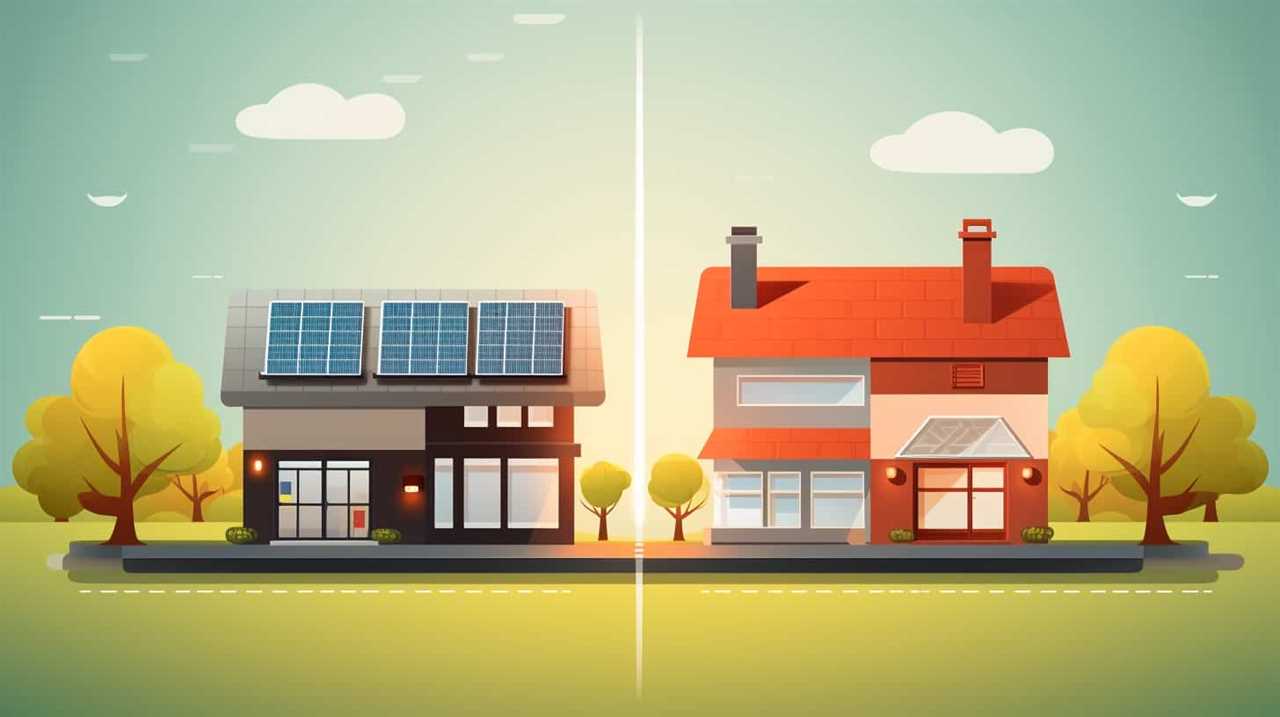
Remember to check for power issues, assess thermostat functionality, clean air filters, evaluate refrigerant levels, and test the defrost cycle.
If you encounter any problems that you’re unable to resolve, don’t hesitate to seek professional help.
Just like a well-tuned heat pump, a little maintenance goes a long way in keeping your home comfortable and efficient.
HVAC Systems
Comparing Heat Pump Efficiency: Solutions for Electricity Usage

We have some astonishing statistics to share with you.
When it comes to heat pump efficiency, understanding the key factors impacting electricity usage is crucial.
In this article, we’ll compare energy consumption between heat pumps and traditional heating systems.
But that’s not all – we’ll also delve into optimizing heat pump performance for lower electricity usage and explore energy-saving solutions.
Join us as we uncover the secrets to maximizing efficiency and reducing electricity consumption.
Key Takeaways
- SEER and HSPF ratings indicate the efficiency of a heat pump, with higher ratings indicating better performance.
- Climate, insulation, heat pump size, and thermostat settings all impact the electricity usage of a heat pump.
- Heat pumps are more energy-efficient than traditional heating systems, as they transfer heat rather than relying on combustion processes.
- Optimizing heat pump performance through smart thermostats, insulation improvements, regular maintenance, and airflow optimization can reduce electricity usage.
Understanding Heat Pump Efficiency Ratings
We’ll start by exploring the three main heat pump efficiency ratings.
When it comes to heat pump efficiency, it’s important to understand the standards and measurements used.
The first rating is the Seasonal Energy Efficiency Ratio (SEER), which measures the cooling efficiency of the heat pump over an entire season. The higher the SEER rating, the more efficient the heat pump is.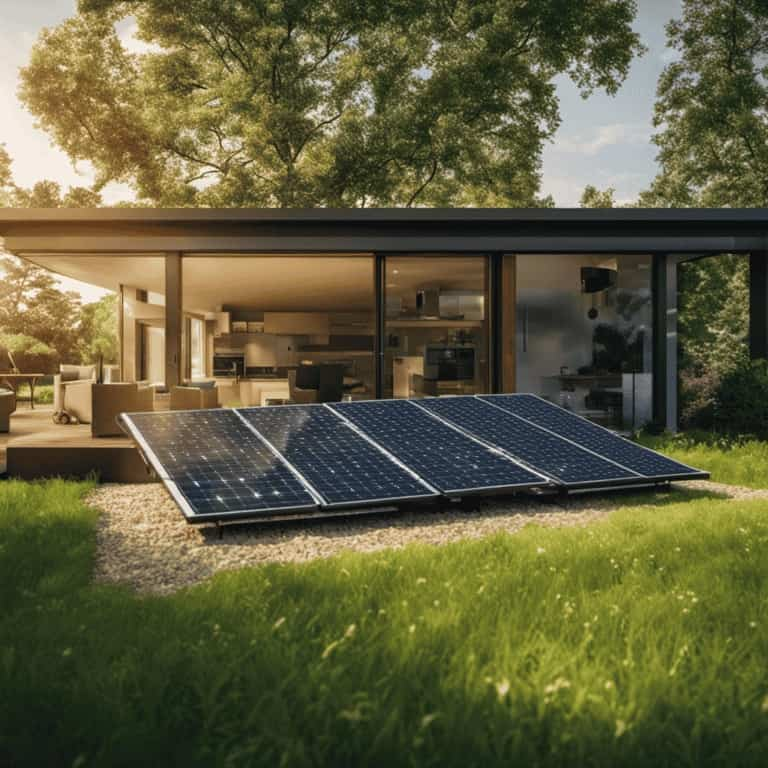
The second rating is the Heating Seasonal Performance Factor (HSPF), which measures the heating efficiency of the heat pump over a season. Again, a higher HSPF rating indicates a more efficient heat pump.
Lastly, we’ve the Coefficient of Performance (COP), which measures the ratio of heat output to the energy input. The higher the COP, the more efficient the heat pump.
Understanding these efficiency ratings is crucial when comparing and selecting a heat pump for optimal energy usage.
Key Factors Impacting Heat Pump Electricity Usage
When considering heat pump electricity usage, there are several key factors that can significantly impact efficiency. To conduct a thorough heat pump energy consumption analysis and maximize efficiency, it’s essential to take into account the following factors: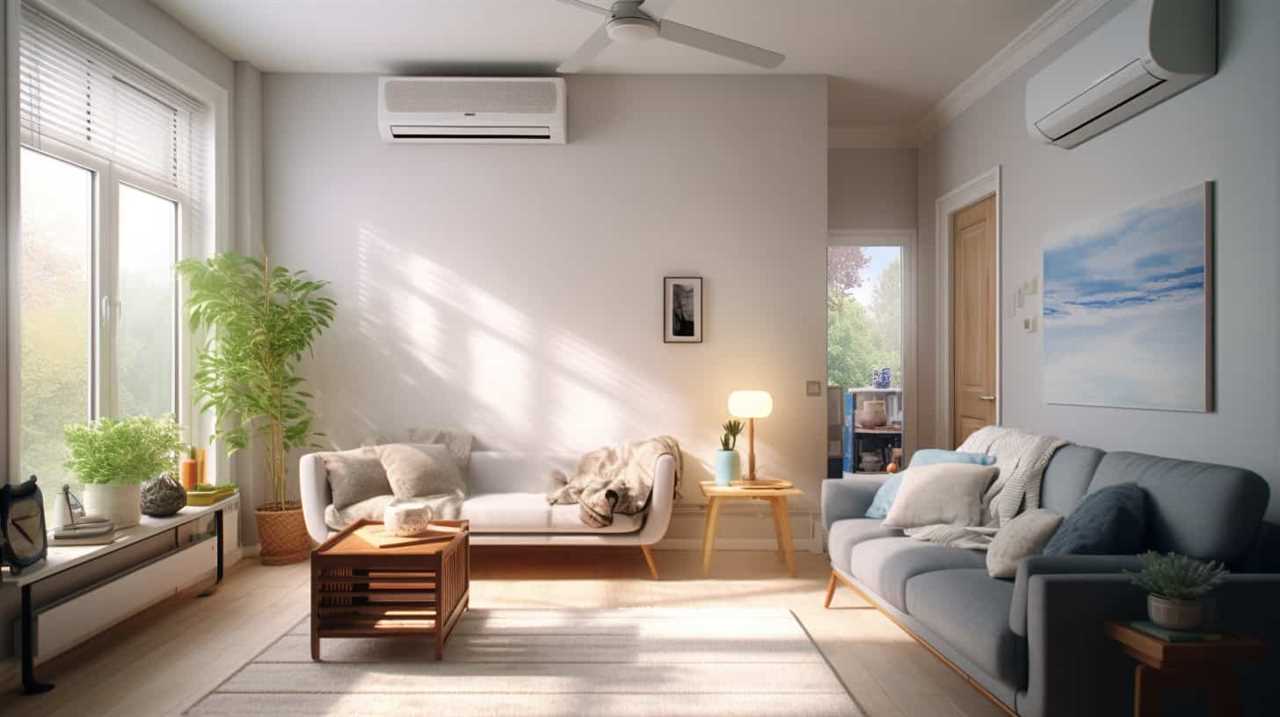
Climate: The temperature and humidity levels in your region can affect how hard the heat pump needs to work to maintain desired indoor temperatures.
Insulation: Proper insulation in your home helps to minimize heat loss, reducing the workload on the heat pump.
Sizing: Choosing the right-sized heat pump for your space is crucial. An oversized or undersized unit can lead to inefficient operation and higher electricity usage.
Thermostat settings: Optimal thermostat settings can help regulate temperature effectively, avoiding unnecessary energy consumption.

Maintenance: Regular maintenance, including cleaning filters and checking refrigerant levels, ensures that the heat pump operates efficiently and minimizes electricity usage.
Comparing Energy Consumption: Heat Pump Vs Traditional Heating Systems
There are several key differences in energy consumption between heat pumps and traditional heating systems.
When comparing the two, it becomes evident that heat pumps are a more energy efficient alternative for cost-effective heating. Heat pumps work by transferring heat from the outside air or ground into a building, rather than generating heat. This significantly reduces the amount of electricity required to provide heating.
Traditional heating systems, on the other hand, typically use combustion processes to generate heat, which can be quite energy-intensive.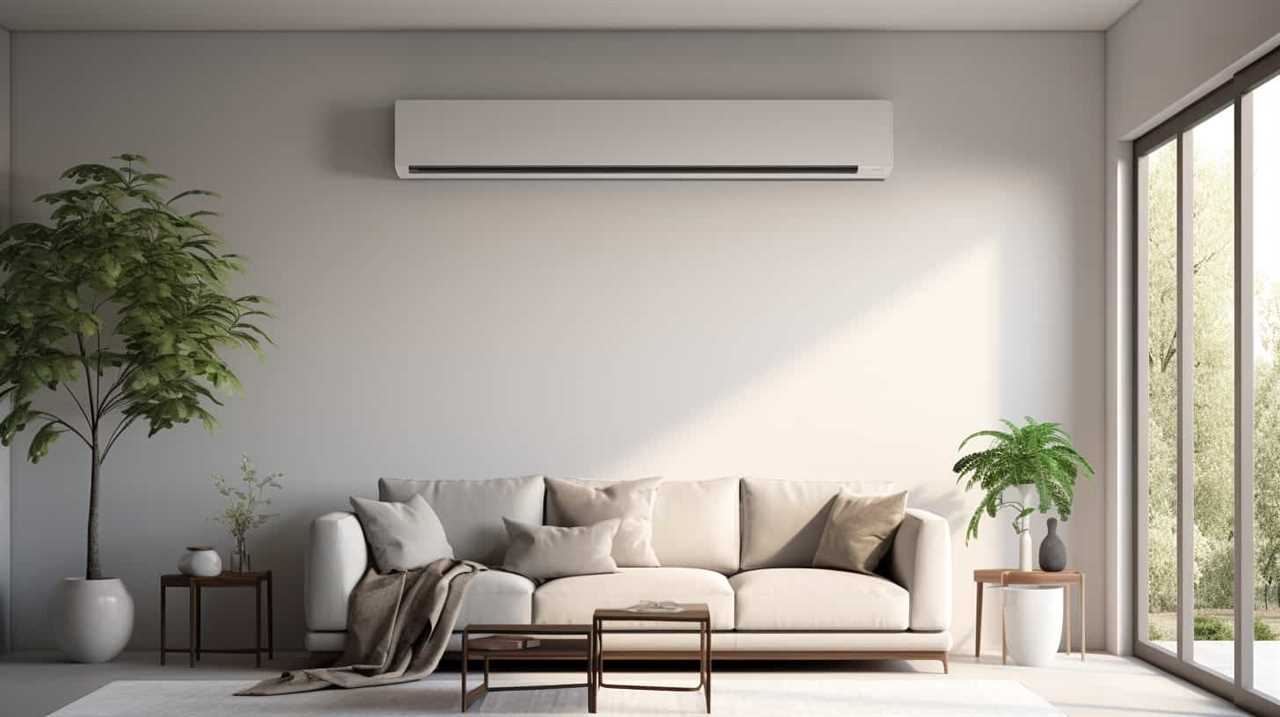
Heat pumps also have the advantage of being able to provide both heating and cooling, further increasing their energy efficiency.
Optimizing Heat Pump Performance for Lower Electricity Usage
To optimize heat pump performance and achieve lower electricity usage, we can implement various strategies and techniques. Here are five key approaches that can help in this endeavor:
Smart Thermostat Integration: By integrating a smart thermostat with your heat pump system, you can have greater control over temperature settings and scheduling, allowing you to optimize energy usage based on your specific needs and preferences.
Insulation Improvements: Enhancing the insulation of your home can significantly reduce heat loss and improve the overall efficiency of your heat pump. Proper insulation in walls, floors, and ceilings minimizes the need for your heat pump to work harder to maintain desired temperatures.
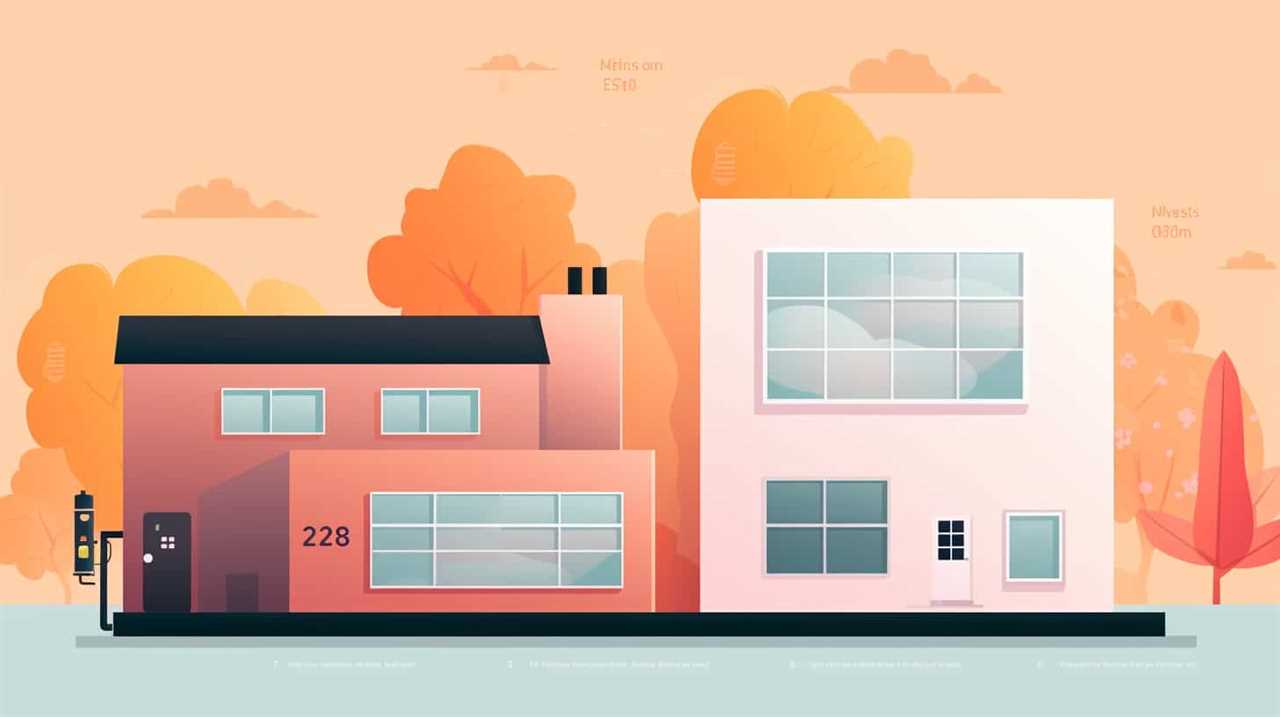
Regular Maintenance: Regularly servicing your heat pump ensures that it operates at its peak efficiency. This includes cleaning or replacing filters, checking refrigerant levels, and inspecting the overall functioning of the system.
Airflow Optimization: Ensuring proper airflow by keeping vents unobstructed and clean allows for efficient heat distribution throughout your home, reducing the workload on your heat pump.
Efficient Temperature Settings: Adjusting your thermostat to slightly lower temperatures in the winter and slightly higher temperatures in the summer can lead to noticeable energy savings without sacrificing comfort.
Energy-Saving Solutions for Heat Pump Electricity Consumption
To reduce heat pump electricity consumption, we can implement energy-saving solutions that optimize efficiency and minimize energy waste. Two effective strategies for achieving this are smart thermostat integration and insulation improvements. By integrating a smart thermostat with your heat pump system, you can take advantage of advanced features such as programmable schedules and remote control options. This allows you to optimize the temperature settings and reduce unnecessary energy usage. Additionally, improving insulation in your home can greatly reduce heat loss and improve the overall efficiency of your heat pump. Proper insulation helps to maintain a consistent indoor temperature, reducing the workload on the heat pump and minimizing electricity consumption. By implementing these energy-saving solutions, you can effectively reduce your heat pump’s electricity usage and save on energy costs.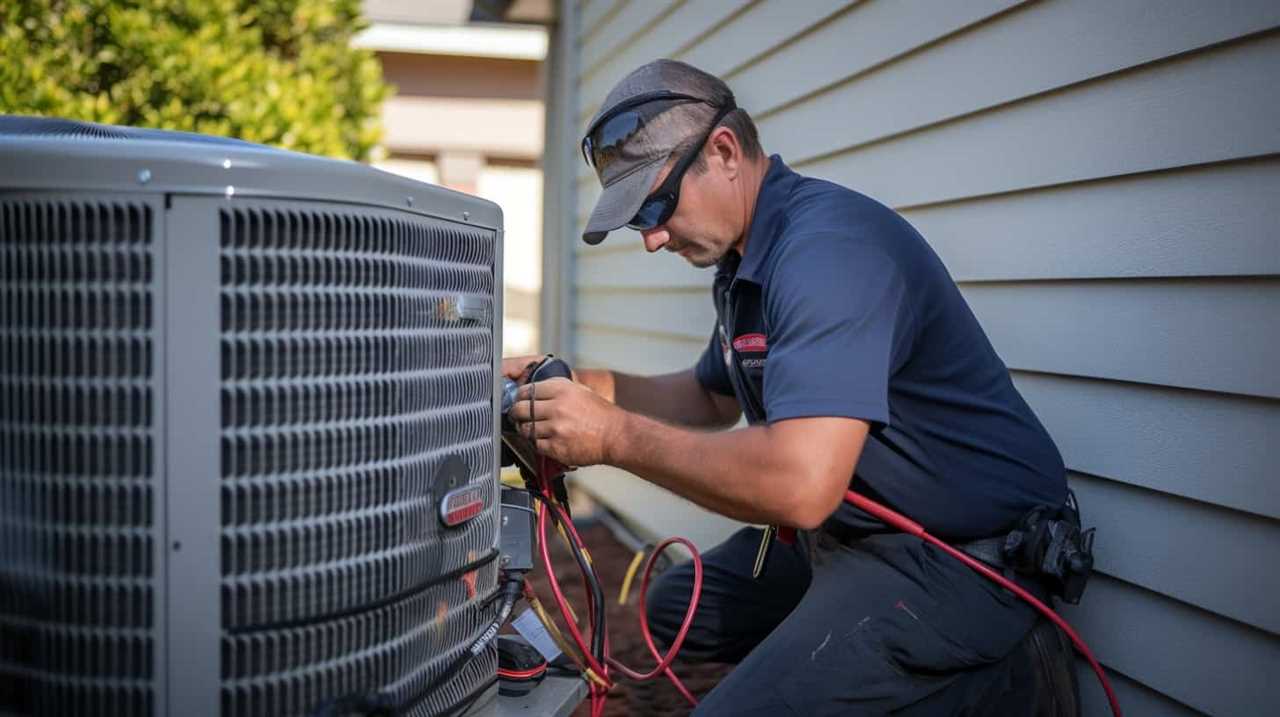
| Energy-Saving Solution | Description | Benefits |
|---|---|---|
| Smart Thermostat Integration | Integrating a smart thermostat with your heat pump system allows for advanced temperature control and scheduling options. This helps optimize energy usage and reduce unnecessary heating and cooling. | – Programmable schedules |
- Remote control options
- Increased energy efficiency | | Insulation Improvements | Improving the insulation in your home reduces heat loss and helps maintain a consistent indoor temperature. This reduces the workload on the heat pump and minimizes electricity consumption. | – Reduced heat loss
- Improved energy efficiency
- Consistent indoor temperature throughout the year |
Frequently Asked Questions
Are There Any Government Incentives or Rebates Available for Installing a Heat Pump?
Yes, there are government incentives and rebates available for installing a heat pump. These incentives can help offset the cost of installation and provide cost savings in the long run due to increased energy efficiency.
How Long Does a Heat Pump Typically Last Before It Needs to Be Replaced?
How long does a heat pump typically last before it needs to be replaced? We’ll explore the heat pump lifespan and the signs of heat pump replacement to help you understand when it’s time for an upgrade.
Can a Heat Pump Be Used to Cool a Home During the Summer Months?
Yes, a heat pump can be used to cool a home during the summer months. It functions by extracting heat from the indoor air and transferring it outside, resulting in a cooler indoor environment.
Are There Any Additional Maintenance Tasks Required for a Heat Pump Compared to Traditional Heating Systems?
There are additional maintenance tasks required for a heat pump compared to traditional heating systems. These tasks include regular filter cleaning or replacement, annual professional inspections, and ensuring proper airflow to optimize energy consumption.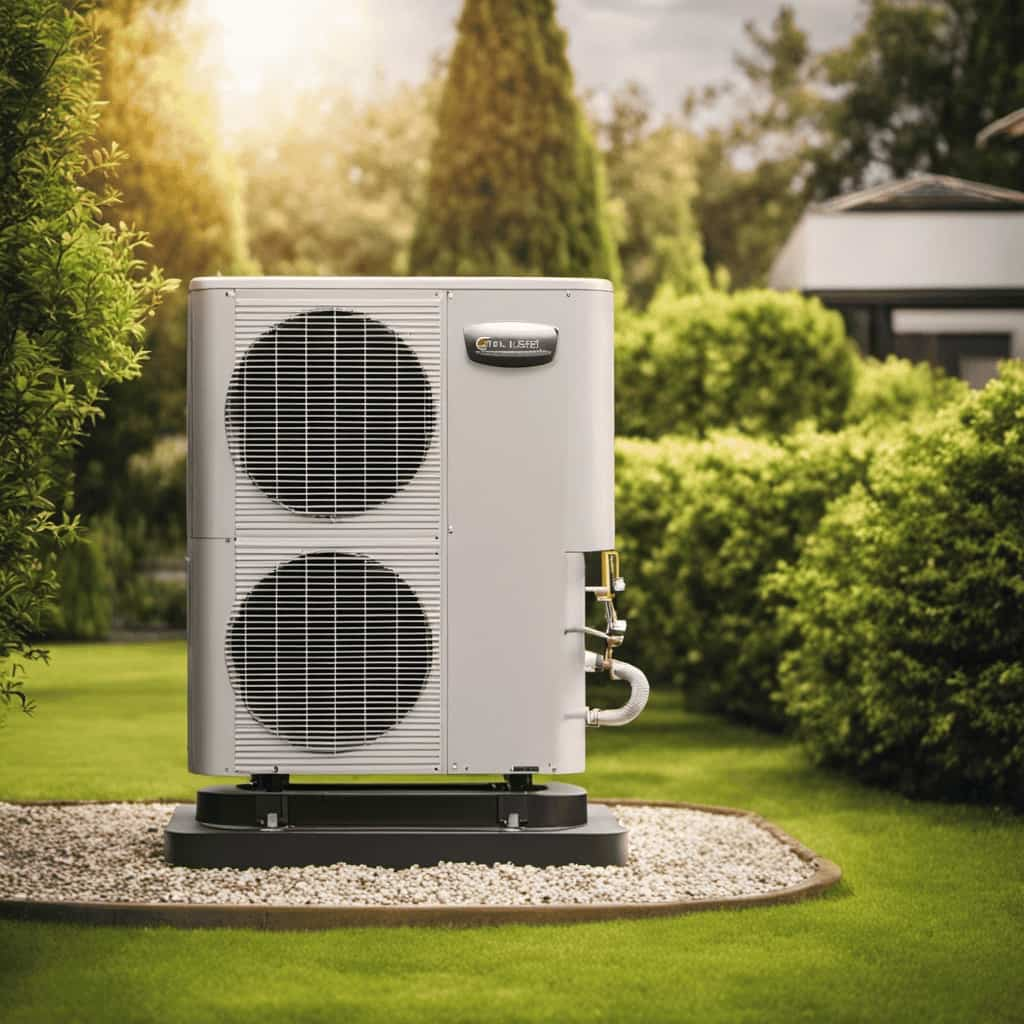
How Does the Efficiency of a Heat Pump Compare to Other Renewable Energy Sources Like Solar Panels or Geothermal Systems?
When comparing heat pump efficiency to other renewable energy sources like solar panels, it’s important to consider the pros and cons. Heat pumps offer efficient heating and cooling, but solar panels provide clean electricity generation.
What Should I Consider When Comparing HVAC Systems and Heat Pumps?
When comparing hvac systems vs heat pump, there are a few key factors to consider. First, evaluate the energy efficiency ratings of each system. The Seasonal Energy Efficiency Ratio (SEER) and Heating Seasonal Performance Factor (HSPF) are essential in determining their efficiency. Additionally, take into account the initial cost, installation requirements, and maintenance needs of both options. Lastly, consider the climate you live in, as this can impact the system’s performance and suitability for your home.
Conclusion
In conclusion, after analyzing the efficiency ratings and energy consumption of heat pumps compared to traditional heating systems, it’s clear that heat pumps offer significant advantages in terms of electricity usage.
By optimizing heat pump performance and implementing energy-saving solutions, users can further reduce their electricity consumption.
So, why settle for outdated and inefficient heating systems when heat pumps provide a smarter, more environmentally friendly solution?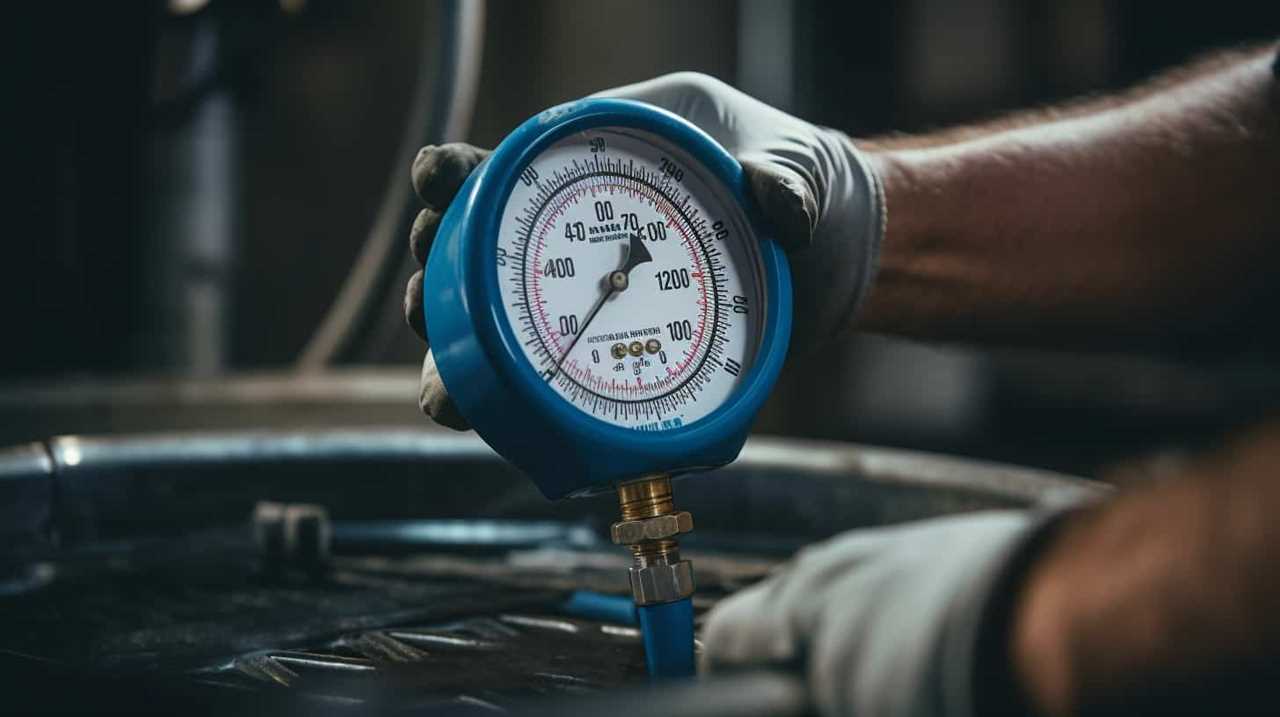
Embrace the future of heating and save both energy and money with heat pumps.
HVAC Systems
Defining ROI: Energy-Efficient Heat Pumps Analysis

We have come across an interesting fact: energy-efficient heat pumps can greatly affect your return on investment (ROI).
In this analysis, we delve into the financial benefits and long-term savings of these innovative devices. By understanding the cost-benefit analysis and factors affecting ROI, you can make informed decisions about implementing energy-efficient heat pumps.
Join us as we explore how this technology can revolutionize your energy consumption and contribute to a more sustainable future.
Key Takeaways
- Calculating ROI helps make informed decisions.
- Heat pumps reduce energy consumption and costs.
- Long-term savings outweigh initial costs.
- Rebates and incentives can reduce upfront costs and increase savings potential.
The Importance of ROI in Energy-Efficient Heat Pumps
We understand the importance of calculating ROI in energy-efficient heat pumps for making informed decisions.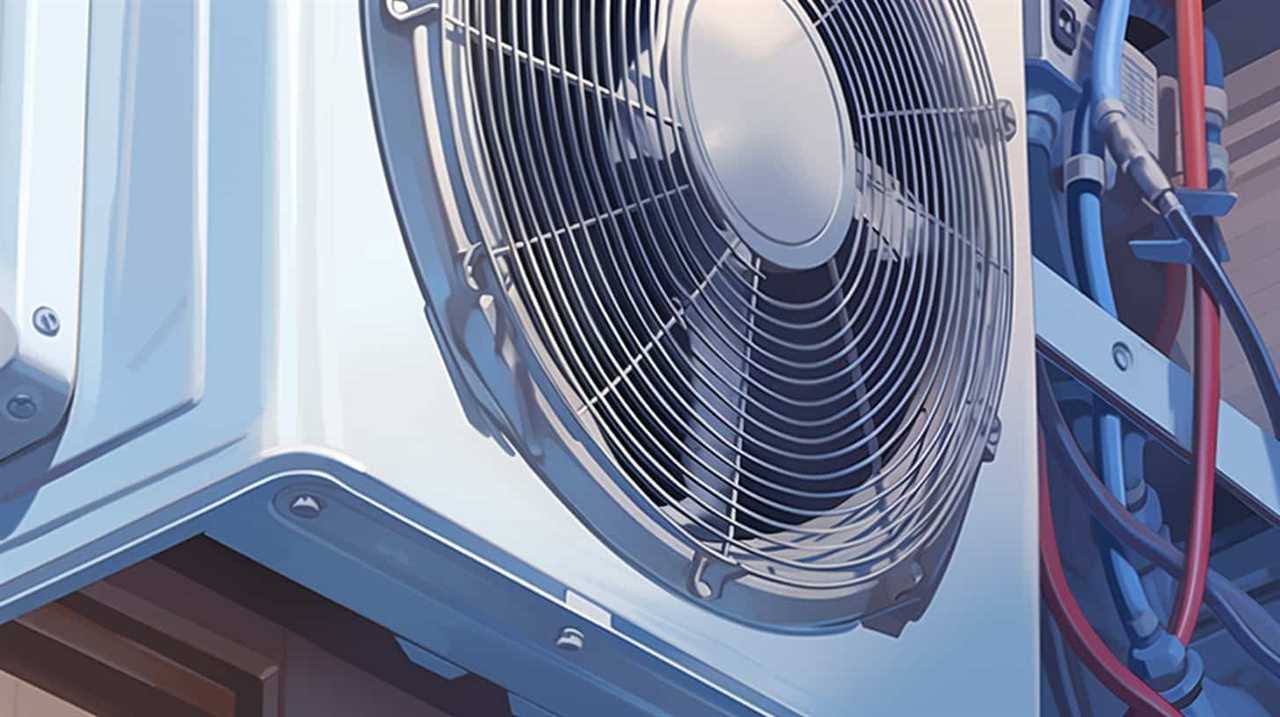
When it comes to investing in energy-efficient heat pumps, it’s crucial to consider the significance of calculating ROI.
By analyzing the relationship between energy savings and return on investment, we can determine the financial benefits of implementing energy-efficient heat pumps in our systems.
Calculating ROI allows us to evaluate the cost-effectiveness of these heat pumps and make informed decisions regarding their adoption.
By considering factors such as upfront costs, energy savings, and maintenance expenses, we can determine the payback period and overall financial viability of these investments.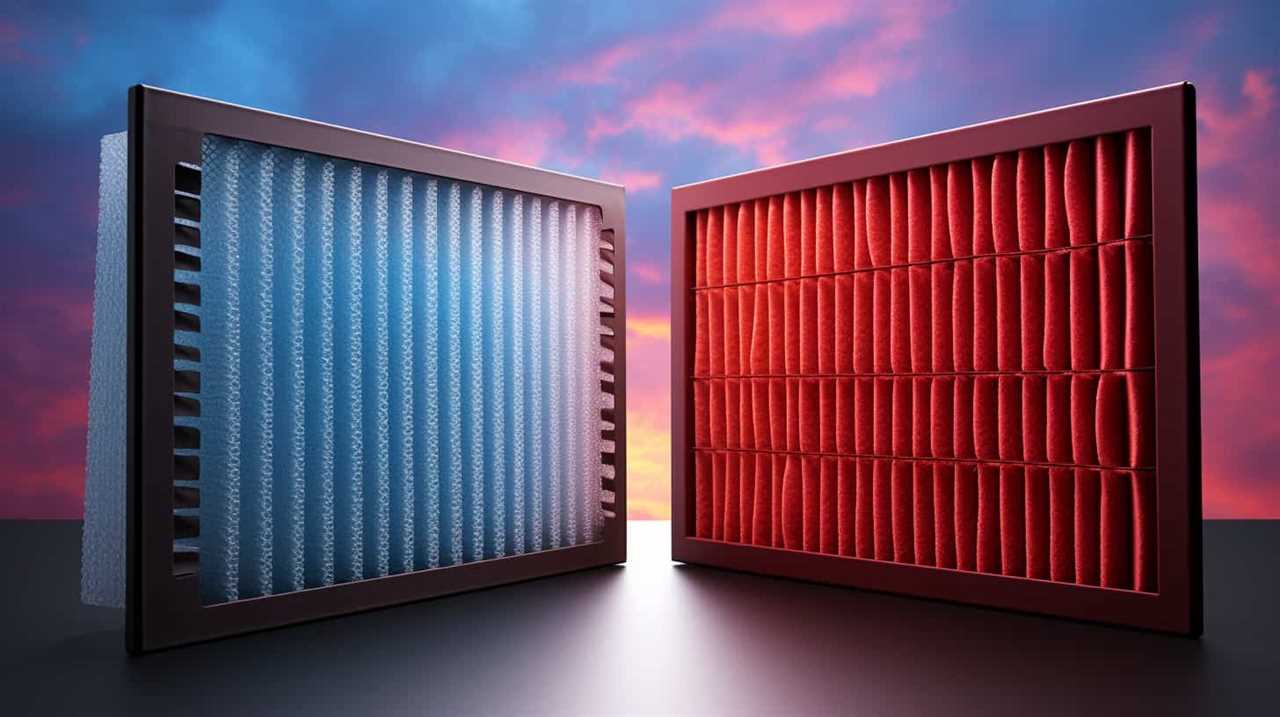
This analysis empowers us to prioritize and allocate resources effectively, ensuring that our energy systems aren’t only efficient but also financially sustainable.
Understanding the Cost-Benefit Analysis of Heat Pump Energy Efficiency
When conducting a cost-benefit analysis of heat pump energy efficiency, it’s essential to consider the financial implications and potential savings. A key component of this analysis is the cost effectiveness analysis, which evaluates the financial benefits of energy consumption reduction achieved through heat pump efficiency.
By comparing the initial investment in energy-efficient heat pumps with the projected savings in energy costs over the system’s lifespan, businesses and homeowners can determine the viability of implementing these technologies. The savings are achieved through reduced energy consumption, as heat pumps utilize renewable energy sources and operate more efficiently than traditional heating and cooling systems.
This cost effectiveness analysis provides a clear understanding of the financial benefits associated with energy-efficient heat pumps, allowing decision-makers to make informed choices regarding their adoption.
Now, let’s delve into the factors that can affect the return on investment (ROI) in energy-efficient heat pumps.
Factors Affecting ROI in Energy-Efficient Heat Pumps
As we explore the factors affecting ROI in energy-efficient heat pumps, it’s important to consider the upfront costs, energy savings, and maintenance expenses. These factors play a crucial role in determining the overall financial benefits of investing in energy-efficient heat pumps.
Firstly, upfront costs are a significant factor in calculating ROI. Energy-efficient heat pumps generally have a higher initial cost compared to traditional heating systems. However, the long-term energy savings they provide can offset this initial expense.
The potential for substantial energy savings is another factor to consider. Energy-efficient heat pumps utilize advanced technology to maximize energy efficiency, resulting in lower energy consumption and reduced utility bills.
Additionally, maintenance expenses should be taken into account when evaluating ROI. While energy-efficient heat pumps require regular maintenance to ensure optimal performance, they generally have lower maintenance costs compared to traditional heating systems.
By considering these factors, we can better understand the potential benefits of investing in energy-efficient heat pumps.
Now, let’s move on to the next section where we’ll analyze the financial benefits of these innovative systems.
Analyzing the Financial Benefits of Energy-Efficient Heat Pumps
To fully understand the financial benefits of energy-efficient heat pumps, we’ll analyze the cost savings and return on investment they offer.
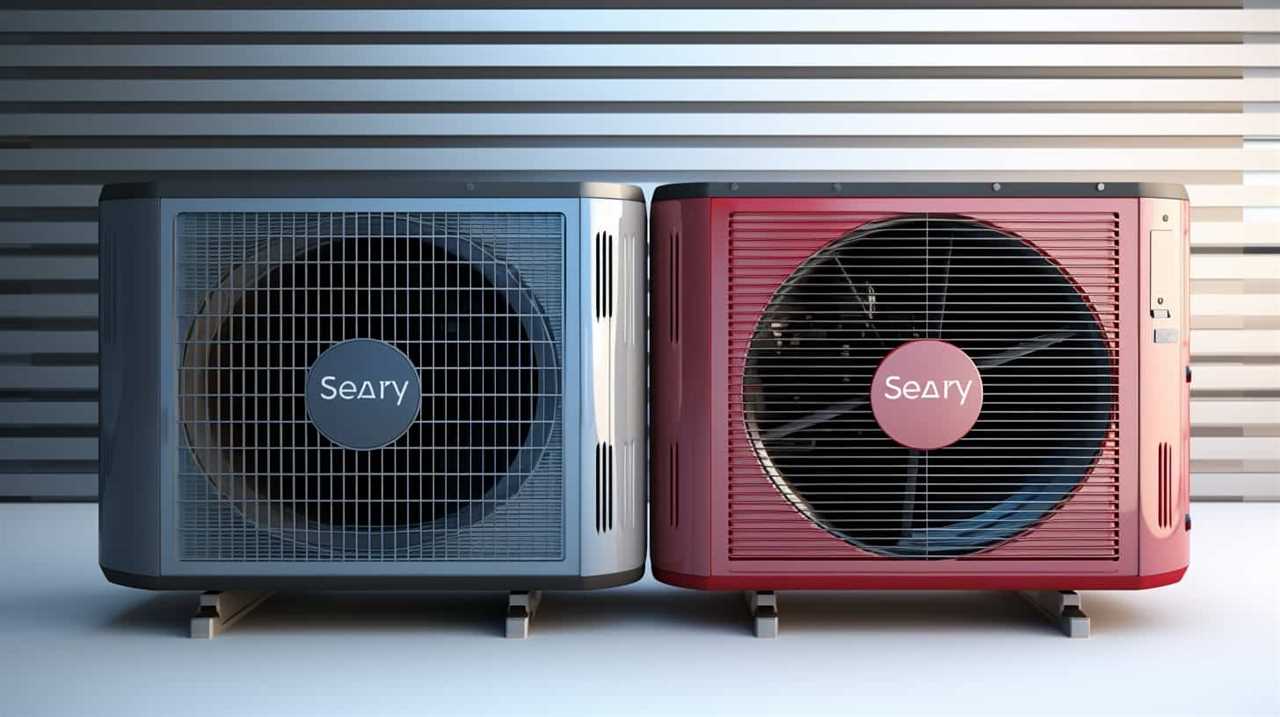
When it comes to the financial implications of energy-efficient heat pumps, the most significant advantage lies in the energy savings they provide. By utilizing advanced technology and efficient design, these heat pumps can significantly reduce energy consumption compared to traditional heating methods. This translates into lower energy bills for homeowners and businesses, resulting in substantial cost savings over time.
Additionally, the return on investment for energy-efficient heat pumps is often quite favorable. While the upfront costs may be higher than conventional heating systems, the long-term savings and reduced energy consumption make them a financially sound choice.
Evaluating the Long-Term Savings of Energy-Efficient Heat Pumps
We will assess the long-term savings of energy-efficient heat pumps and determine their financial viability.
When evaluating the performance of energy-efficient heat pumps and comparing models, the following factors should be considered:
Energy Efficiency: Look for heat pumps with high energy efficiency ratings, which indicate lower energy consumption and potential cost savings over time.
Operational Costs: Consider the maintenance and repair costs associated with different heat pump models. Lower operational costs can contribute to long-term savings.
Lifespan: Evaluate the expected lifespan of the heat pump models being compared. Longer lifespans can result in greater overall savings.
Rebates and Incentives: Research available rebates and incentives for energy-efficient heat pumps. Take advantage of these programs to maximize savings.

Frequently Asked Questions
How Does the Installation Process of Energy-Efficient Heat Pumps Affect the Roi?
The installation process of energy-efficient heat pumps significantly impacts the ROI. By optimizing the installation, we can ensure maximum energy savings, leading to a higher return on investment and increased efficiency for our innovative audience.
Are There Government Incentives or Rebates Available for Investing in Energy-Efficient Heat Pumps?
Yes, there are government incentives and rebates available for investing in energy-efficient heat pumps. These incentives provide financial benefits that can significantly impact the return on investment for individuals and businesses.
What Are the Maintenance Requirements for Energy-Efficient Heat Pumps and How Do They Impact the Overall Roi?
Maintenance costs for energy-efficient heat pumps can impact the overall ROI. Regular maintenance ensures optimal performance and extends the lifespan of the system. However, these costs are outweighed by the long-term savings in energy consumption.
How Does the Climate and Geographical Location Affect the Efficiency and ROI of Energy-Efficient Heat Pumps?
The climate impact and geographical factors play a significant role in the efficiency and ROI of energy-efficient heat pumps. These variables determine the unit’s performance and potential savings, making them crucial considerations for innovative solutions.
Are There Any Potential Risks or Drawbacks Associated With Investing in Energy-Efficient Heat Pumps That Could Impact the Roi?
There can be potential risks and drawbacks associated with investing in energy-efficient heat pumps that could impact the ROI. It is crucial to analyze factors like maintenance costs and potential technology obsolescence before making the investment.
What Factors Contribute to the Cost-Efficiency of Energy-Efficient Heat Pumps?
The cost-efficiency of energy-efficient heat pumps is influenced by several factors. Firstly, the upfront cost of purchasing and installing the heat pump plays a significant role. Additionally, the energy consumption and efficiency ratings of the pump impact its operating costs. Proper maintenance and insulation of the building also contribute to its cost-efficiency. Lastly, available government incentives and rebates can further enhance the overall cost-efficiency of energy-efficient heat pumps.
Conclusion
In conclusion, energy-efficient heat pumps offer a promising return on investment (ROI) for homeowners and businesses. By carefully analyzing the cost-benefit analysis and considering factors such as energy savings and long-term financial benefits, it’s clear that investing in these heat pumps can lead to significant savings and contribute to a more sustainable future.
Symbolically, energy-efficient heat pumps act as a beacon of efficiency, guiding us towards a greener and more cost-effective solution for heating and cooling needs.
HVAC Systems
Revolutionizing Climate Control: Green Heating Reduces Carbon Footprint

Are you aware that traditional heating methods account for a significant 30% of worldwide carbon emissions? It’s time for a shift.
In this article, we explore the revolutionary world of green heating and its potential to reduce our carbon footprint. By harnessing the power of renewable energy sources and prioritizing energy efficiency, we can pave the way towards a sustainable future.
Join us as we uncover the solutions that will liberate us from the shackles of harmful climate control practices.
Key Takeaways
- Conventional heating methods contribute significantly to global carbon emissions and have adverse effects on air quality and human health.
- Sustainable alternatives, such as heat pumps and renewable energy-powered heating systems, can significantly reduce emissions and reliance on fossil fuels.
- Geothermal and solar heating systems offer benefits such as lower greenhouse gas emissions, energy cost savings, and increased energy independence.
- Energy efficiency measures in heating systems play a vital role in reducing energy consumption, greenhouse gas emissions, and financial savings through lower utility bills.
The Environmental Impact of Conventional Heating Methods
We need to understand the environmental impact of conventional heating methods in order to make informed decisions about reducing our carbon footprint.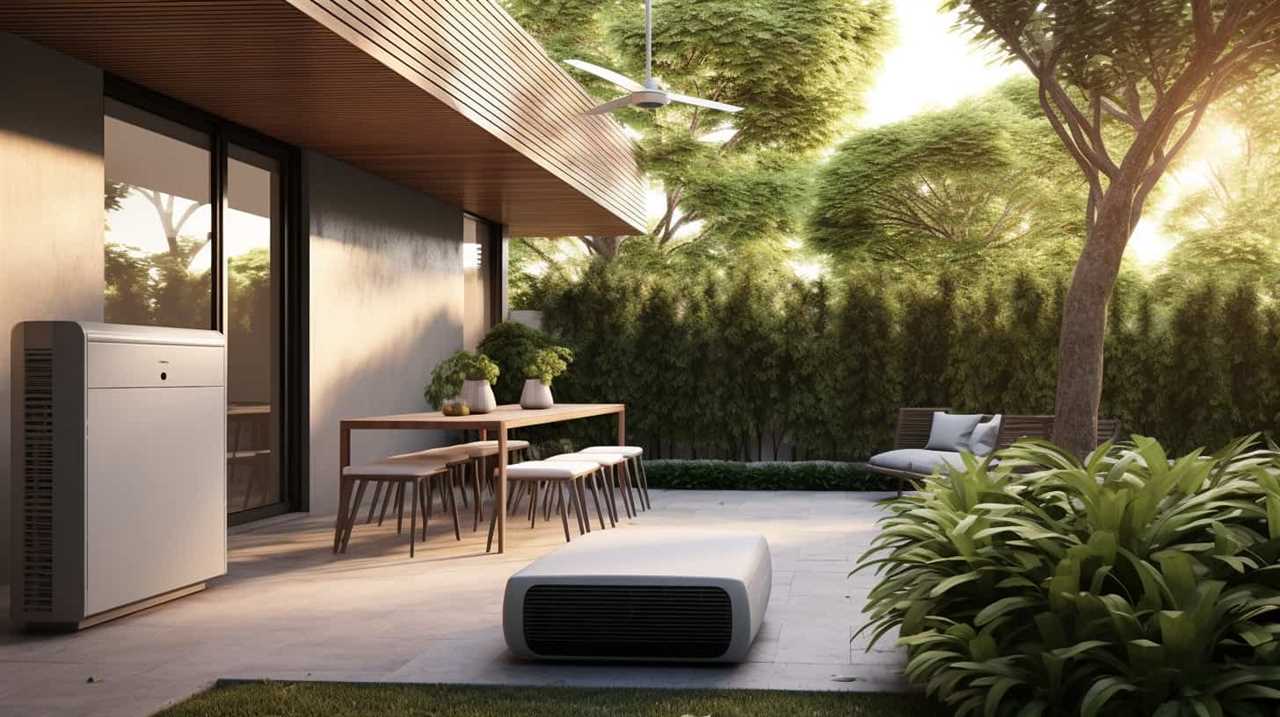
Conventional heating methods, such as the burning of fossil fuels, contribute significantly to greenhouse gas emissions. According to the United States Environmental Protection Agency, residential heating accounts for nearly a quarter of total emissions. These emissions not only contribute to climate change but also have adverse effects on air quality and human health.
It’s imperative that we explore sustainable alternatives to reduce emissions. One such alternative is the use of renewable energy sources, such as geothermal or solar heating systems. These systems harness clean energy, reducing our dependence on fossil fuels and minimizing carbon emissions.
Understanding Heat Pump Technology and Its Benefits
Heat pump technology offers numerous benefits in terms of energy efficiency and sustainability. Here are four key advantages of geothermal heating and heat pump efficiency:
Lower energy consumption: Heat pumps operate by transferring heat from one place to another, rather than generating heat themselves. This results in significant energy savings compared to traditional heating methods.
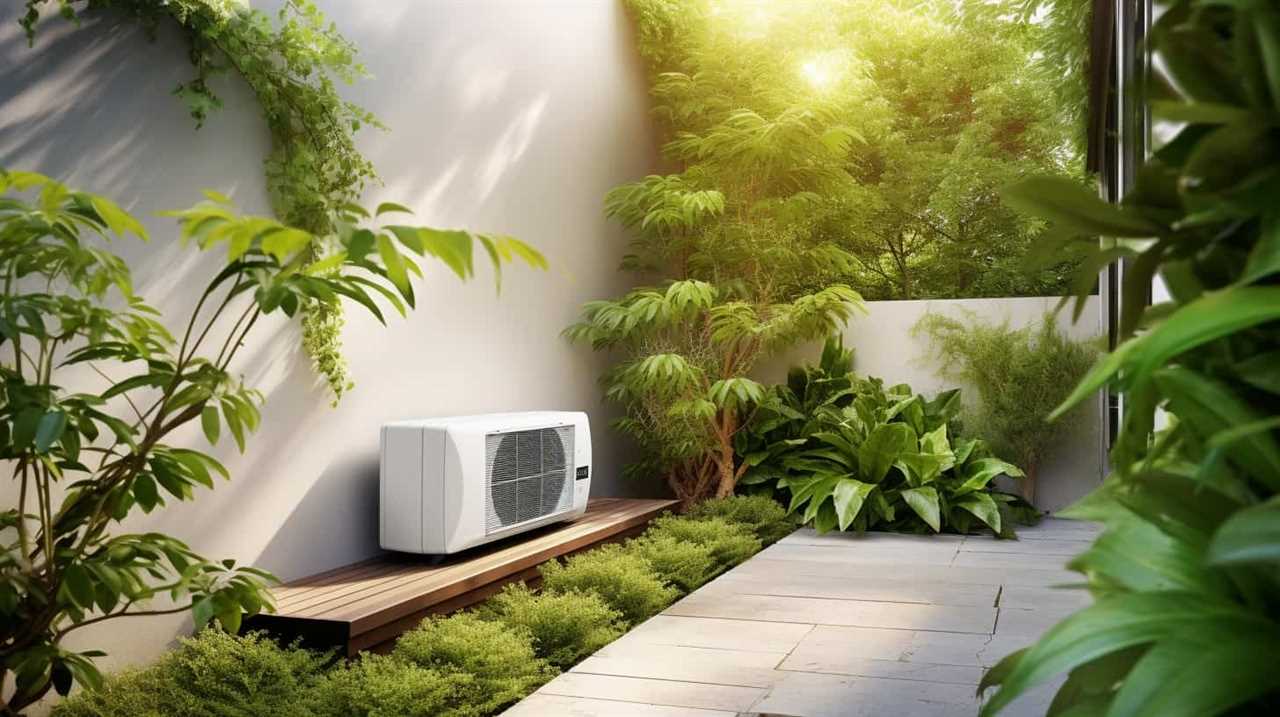
Reduced carbon footprint: By utilizing renewable energy sources, such as the heat from the ground or air, heat pumps emit fewer greenhouse gases than fossil fuel-based heating systems. This helps combat climate change and reduces our overall carbon footprint.
Year-round comfort: Heat pumps can provide both heating and cooling capabilities, making them versatile and suitable for all seasons. They can extract heat from the environment to warm your home in winter and reverse the process to cool it during summer.
Cost savings: Due to their high energy efficiency, heat pumps can lead to substantial cost savings on monthly utility bills. Additionally, geothermal heating systems have lower maintenance requirements and a longer lifespan compared to other heating systems, further reducing expenses.
Exploring Renewable Energy Sources for Heating
By harnessing the power of renewable energy sources, such as solar and geothermal, we can significantly reduce our carbon footprint while providing efficient heating solutions. Geothermal heating utilizes the Earth’s natural heat to warm our homes and buildings, while solar heating harnesses the energy from the sun. These renewable energy sources offer numerous benefits, including lower greenhouse gas emissions, lower energy costs, and increased energy independence.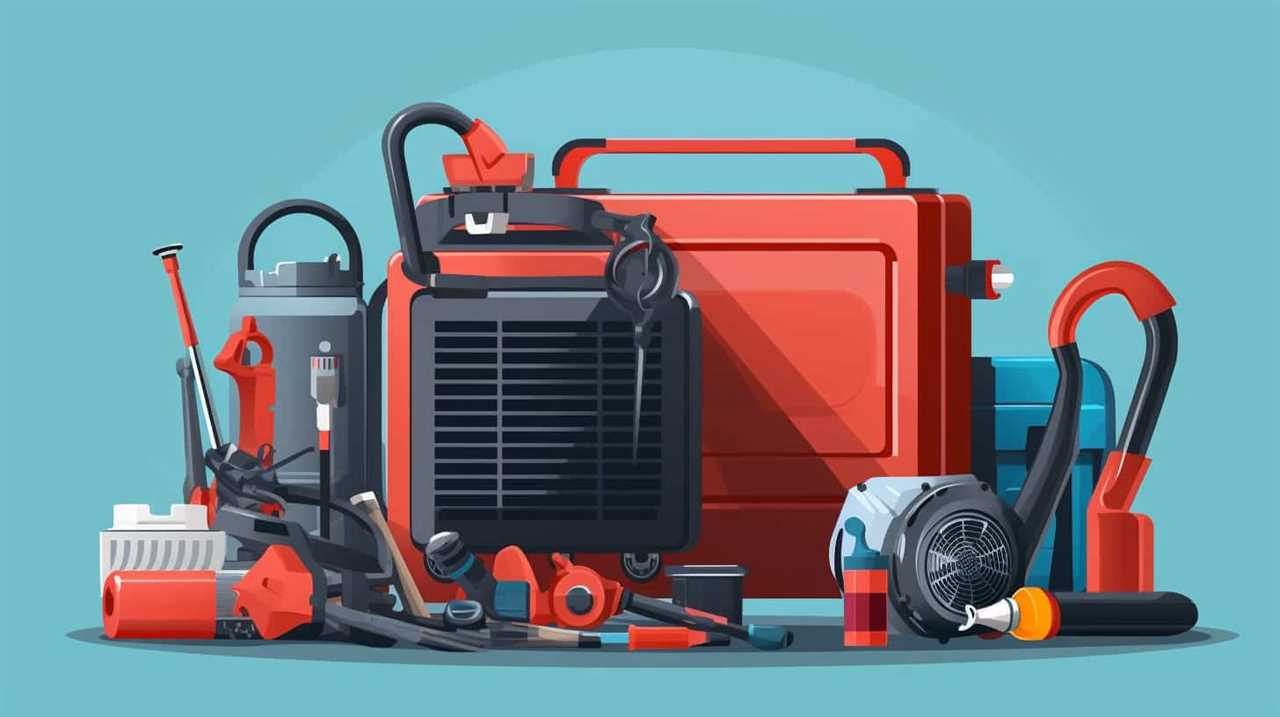
In geothermal heating systems, heat pumps are used to transfer the heat from the ground to the building, providing a reliable and constant source of warmth. Solar heating systems, on the other hand, use solar collectors to absorb the sun’s energy and convert it into heat, which is then used for heating purposes.
To better understand the advantages of geothermal and solar heating, let’s take a look at the following table:
| Renewable Energy Source | Advantages |
|---|---|
| Geothermal Heating | – High energy efficiency |
- Minimal environmental impact
- Reliable and constant heat supply | | Solar Heating | – Abundant and renewable energy source
- Reduced reliance on fossil fuels
- Lower energy costs |
The Role of Energy Efficiency in Reducing Carbon Footprint
One of the key ways to reduce our carbon footprint is by improving energy efficiency in our heating systems. By incorporating energy efficient appliances and sustainable building design, we can significantly decrease our energy consumption and greenhouse gas emissions.
Here are four reasons why energy efficiency plays a crucial role in reducing our carbon footprint:
Lower energy consumption: Energy efficient appliances are designed to use less energy while still providing the same level of comfort. This means less energy is needed to heat our homes, resulting in reduced carbon emissions.
Reduced reliance on fossil fuels: Energy efficiency measures can help us decrease our dependence on fossil fuels for heating. By using renewable energy sources such as solar or geothermal, we can further reduce our carbon footprint.
Financial savings: Energy efficient heating systems can lead to significant cost savings over time. By reducing energy consumption, homeowners can lower their utility bills and save money while also reducing their carbon footprint.
Climate change mitigation: Improving energy efficiency in heating systems is a practical and effective way to mitigate climate change. By reducing carbon emissions, we can contribute to the global effort to combat the adverse effects of climate change.

Green Heating Solutions for a Sustainable Future
As we look to the future, we can achieve a sustainable and eco-friendly heating system by implementing green heating solutions. Two key solutions that hold great promise are solar powered heating and geothermal technology. Solar powered heating utilizes the sun’s energy to generate heat, reducing our reliance on fossil fuels and lowering carbon emissions. This technology harnesses the power of solar panels to convert sunlight into usable energy for heating purposes. On the other hand, geothermal technology involves tapping into the Earth’s natural heat to warm our homes and buildings. By utilizing the constant temperature beneath the Earth’s surface, geothermal systems provide efficient and renewable heating. Both solar powered heating and geothermal technology offer viable alternatives to traditional heating methods, allowing us to reduce our carbon footprint while enjoying the benefits of a sustainable future.
| Solar Powered Heating | Geothermal Technology | |
|---|---|---|
| – Utilizes sunlight to generate heat | Taps into the Earth’s natural heat | |
| – Reduces reliance on fossil fuels | Provides efficient and renewable heating | |
| – Lowers carbon emissions | Utilizes constant temperature beneath the Earth’s surface | |
| – Utilizes solar panels | Offers a sustainable alternative to traditional heating methods | |
| – Provides a sustainable and eco-friendly heating solution | Allows for a reduction in carbon footprint |
Frequently Asked Questions
How Much Does It Cost to Install a Heat Pump System for Heating?
Cost of installing a heat pump system for heating varies based on factors like size, type, and location. However, a cost comparison shows that heat pumps are more energy-efficient in the long run, leading to significant savings.
Are There Any Government Incentives or Rebates Available for Switching to Green Heating Solutions?
Yes, there are government incentives and rebates available for switching to green heating solutions. These financial benefits can help offset the cost of installation and encourage the adoption of more environmentally-friendly heating systems.
What Is the Average Lifespan of a Heat Pump System Compared to Conventional Heating Methods?
The average lifespan of a heat pump system is significantly longer compared to conventional heating methods. This not only improves heat pump efficiency but also reduces the environmental impact of traditional heating methods.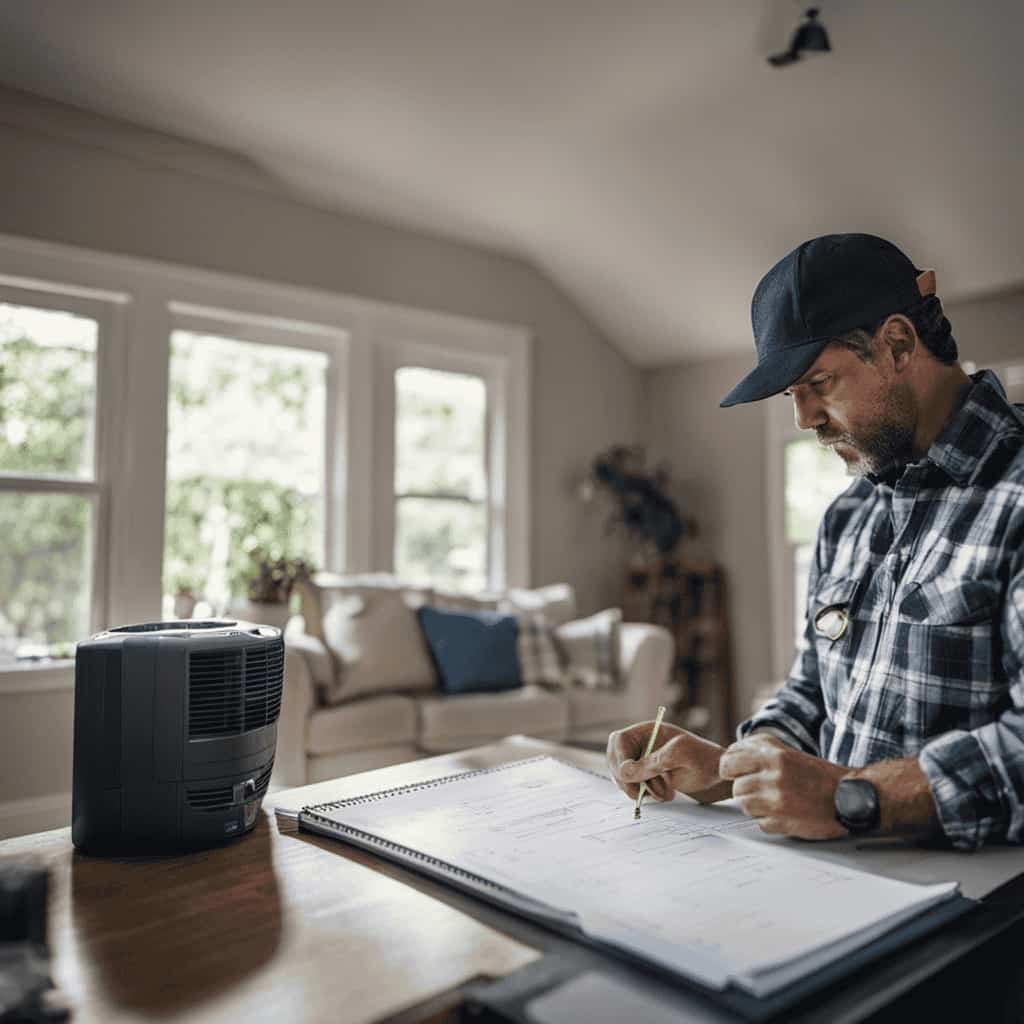
Can Green Heating Solutions Be Integrated With Existing Heating Systems in Older Homes?
Renovating older homes can be a challenge when retrofitting existing heating systems. However, with the right expertise and technology, integrating green heating solutions into older homes is not only possible but also a step towards liberation from carbon-intensive practices.
Are There Any Limitations or Drawbacks to Using Renewable Energy Sources for Heating?
There are limitations and drawbacks to using renewable energy sources for heating. These include higher upfront costs, intermittent energy generation, and the need for backup systems. However, with advancements in technology, these challenges can be overcome, leading to a greener and more sustainable future.
How Does Green Heating Using Heat Pumps Contribute to Reducing Electricity Usage?
Green heating using heat pump efficiency solutions significantly reduces electricity usage. Heat pumps extract renewable heat energy from the environment and use it to heat buildings. By doing so, they consume less electricity compared to traditional heating systems. Heat pump efficiency solutions optimize the performance of these systems, allowing them to provide heating and cooling with minimal electricity input. This reduces energy consumption, lowers carbon emissions, and contributes to a more sustainable and eco-friendly future.
Conclusion
In conclusion, green heating solutions have the potential to revolutionize climate control and significantly reduce our carbon footprint. By utilizing heat pump technology and renewable energy sources, we can achieve both energy efficiency and environmental sustainability.
One interesting statistic to note is that switching to green heating methods can reduce carbon emissions by up to 70%, making it a crucial step towards a more sustainable future.
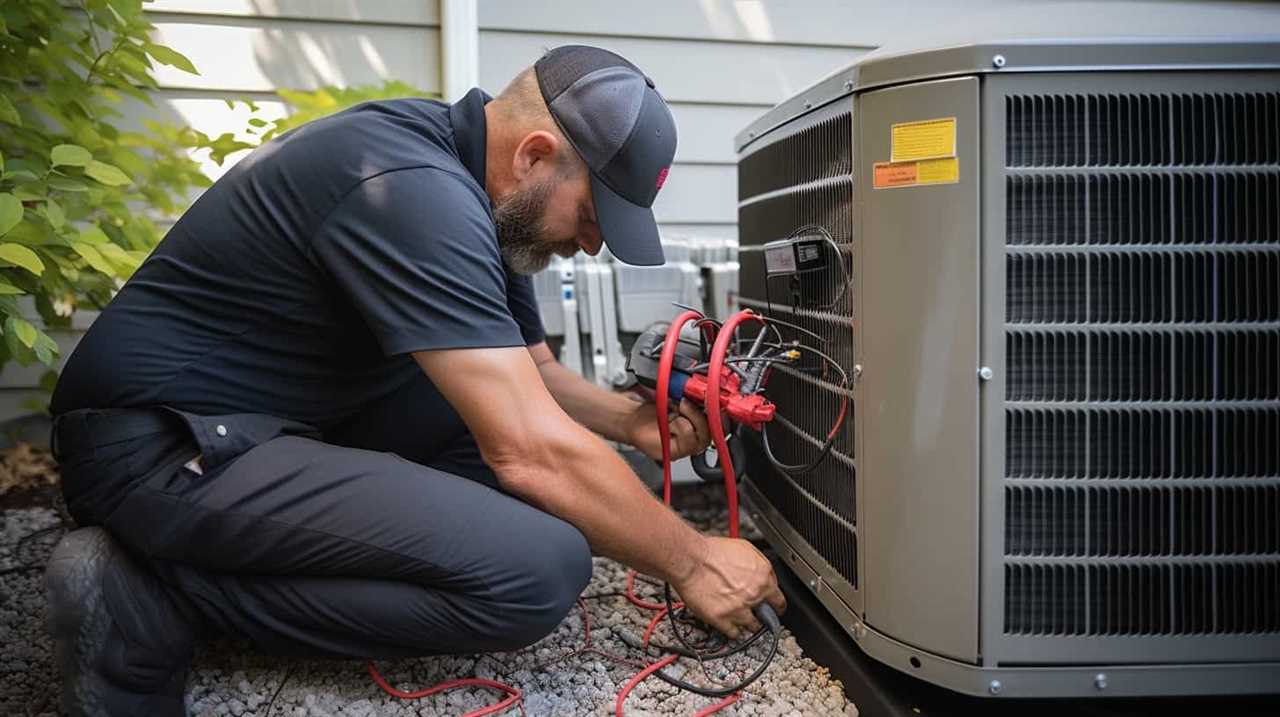
Let’s embrace these solutions and work towards a cleaner and greener planet.
-

 Residential and Commercial Applications2 weeks ago
Residential and Commercial Applications2 weeks agoBest Amana Heat Pump Reviews
-

 Thermal Energy Transfer2 weeks ago
Thermal Energy Transfer2 weeks agoBreakthroughs in Modern Heat Pump Systems: Thermal Energy Edition
-

 Residential and Commercial Applications2 weeks ago
Residential and Commercial Applications2 weeks agoBest Heat Pump
-

 Geothermal Heat Pumps3 months ago
Geothermal Heat Pumps3 months agoUpgrade Your Comfort with Our Efficient HVAC Systems
-

 Air Conditioning3 months ago
Air Conditioning3 months agoExploring Energy-Efficient Air Conditioning Heat Pumps
-

 Geothermal Heat Pumps3 months ago
Geothermal Heat Pumps3 months agoInnovative Geothermal Heat Pump Manufacturers Revolutionize Energy Efficiency
-

 Thermal Energy Transfer1 month ago
Thermal Energy Transfer1 month agoBoost Your Heat Pump Efficiency: Interactive Guide
-

 Residential and Commercial Applications2 weeks ago
Residential and Commercial Applications2 weeks agoBest Portable Heat Pump Heat & AC










